The document provides an overview of using the GNU Debugger (GDB) to debug C/C++ programs. It discusses starting GDB and loading symbol tables, setting breakpoints and watchpoints, running and attaching to programs, and examining variables. The key principles of debugging with GDB are stepping through code, breaking execution at specific points, and inspecting program state to methodically isolate bugs.


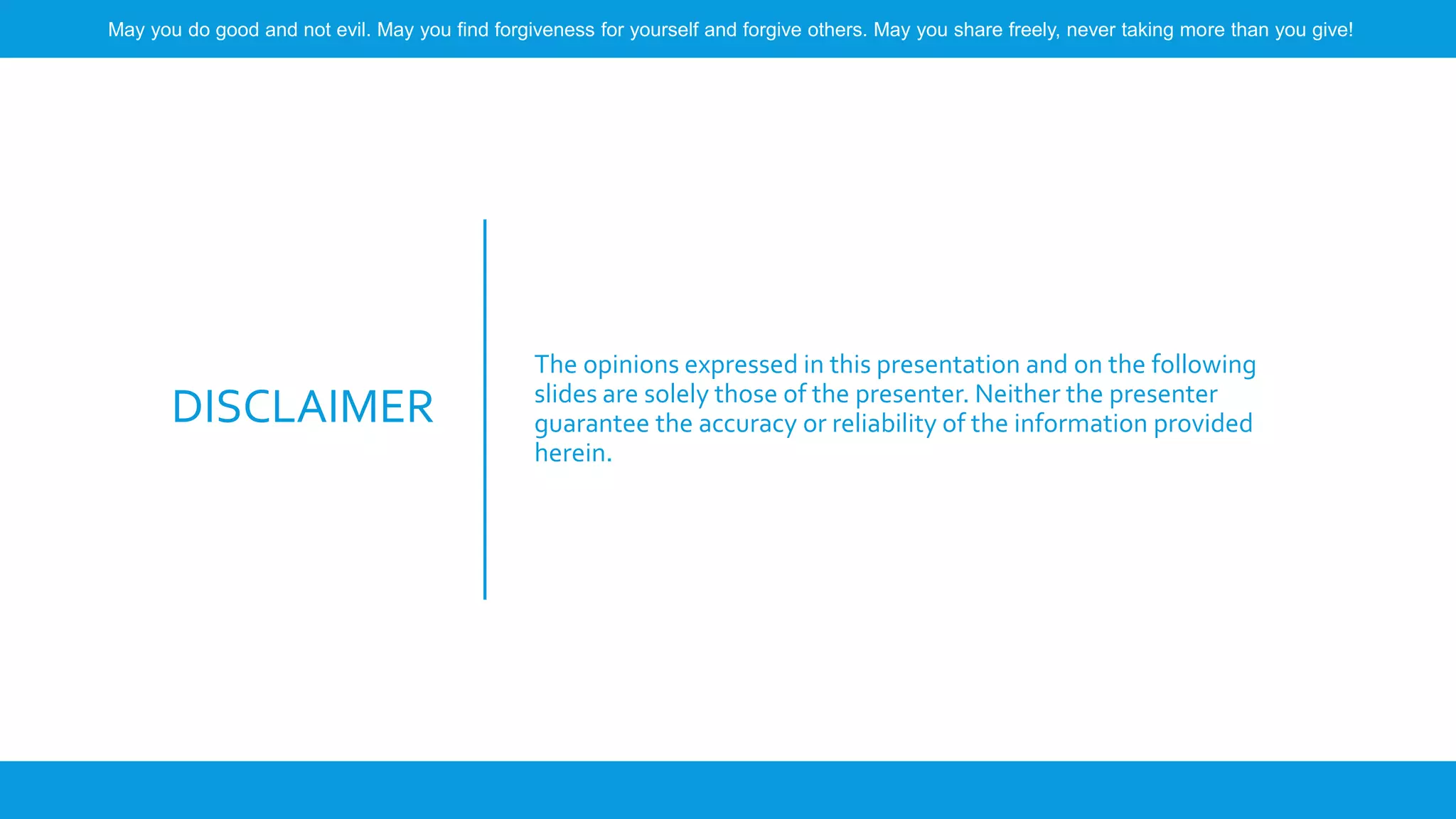


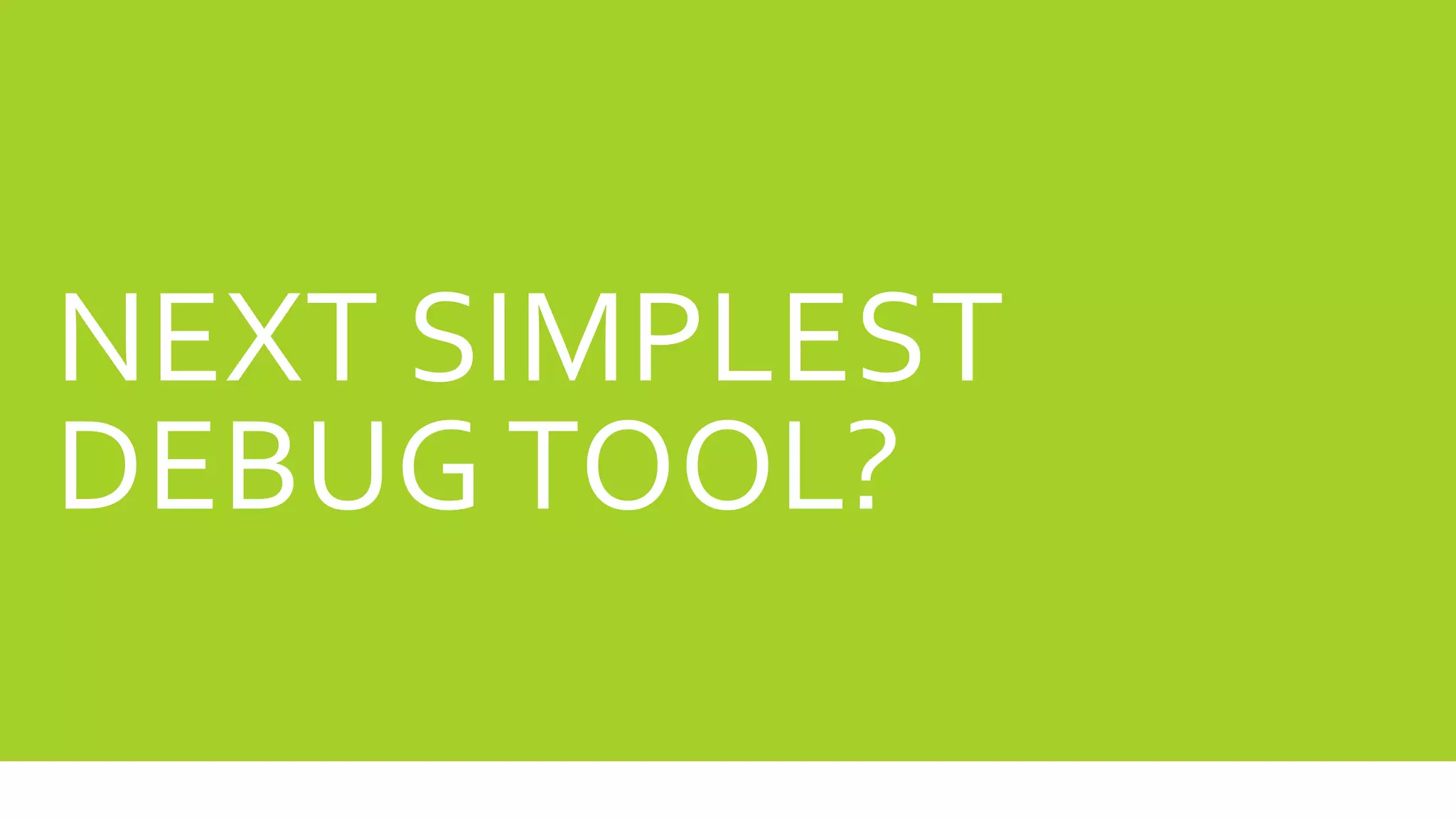

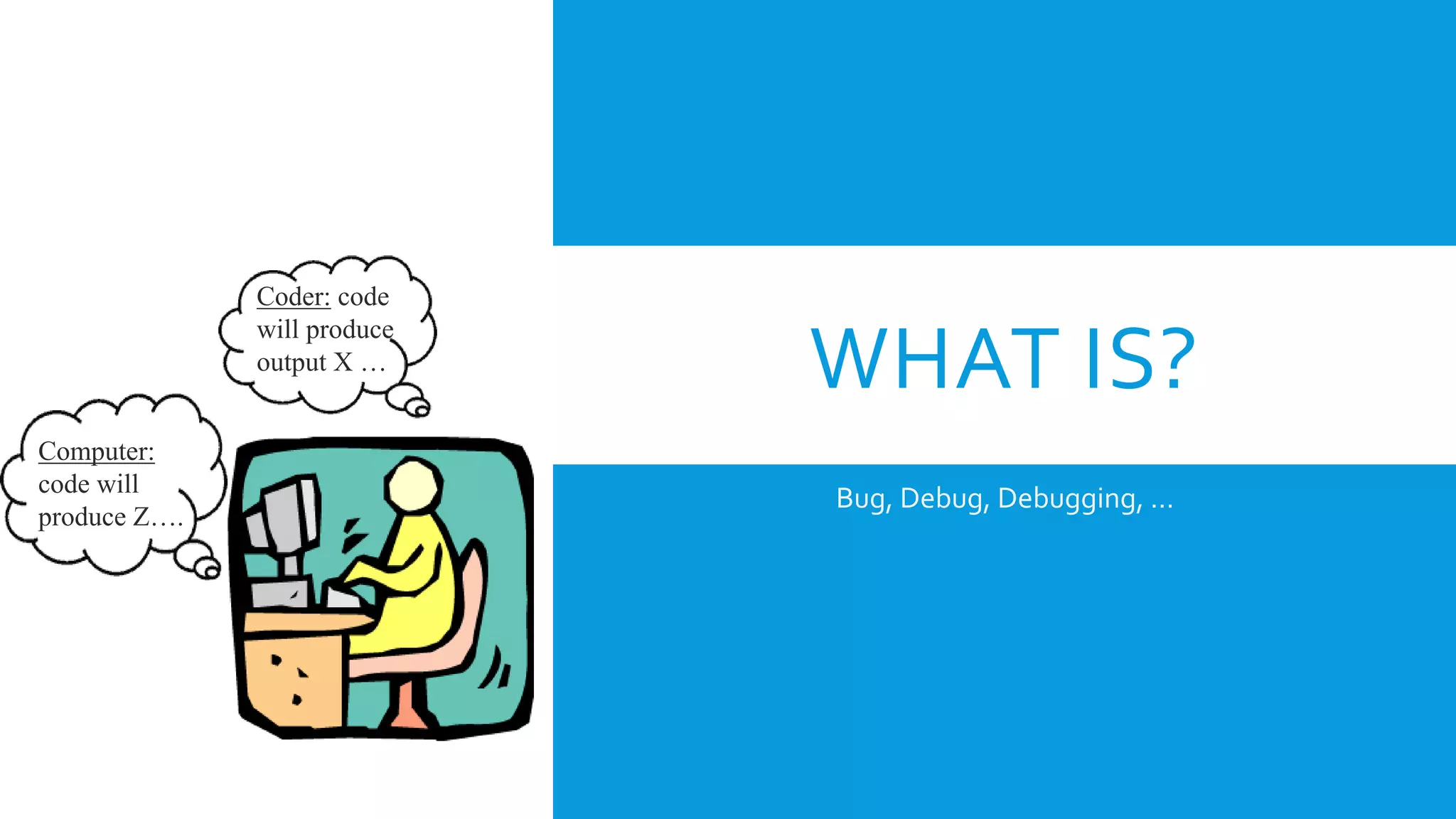
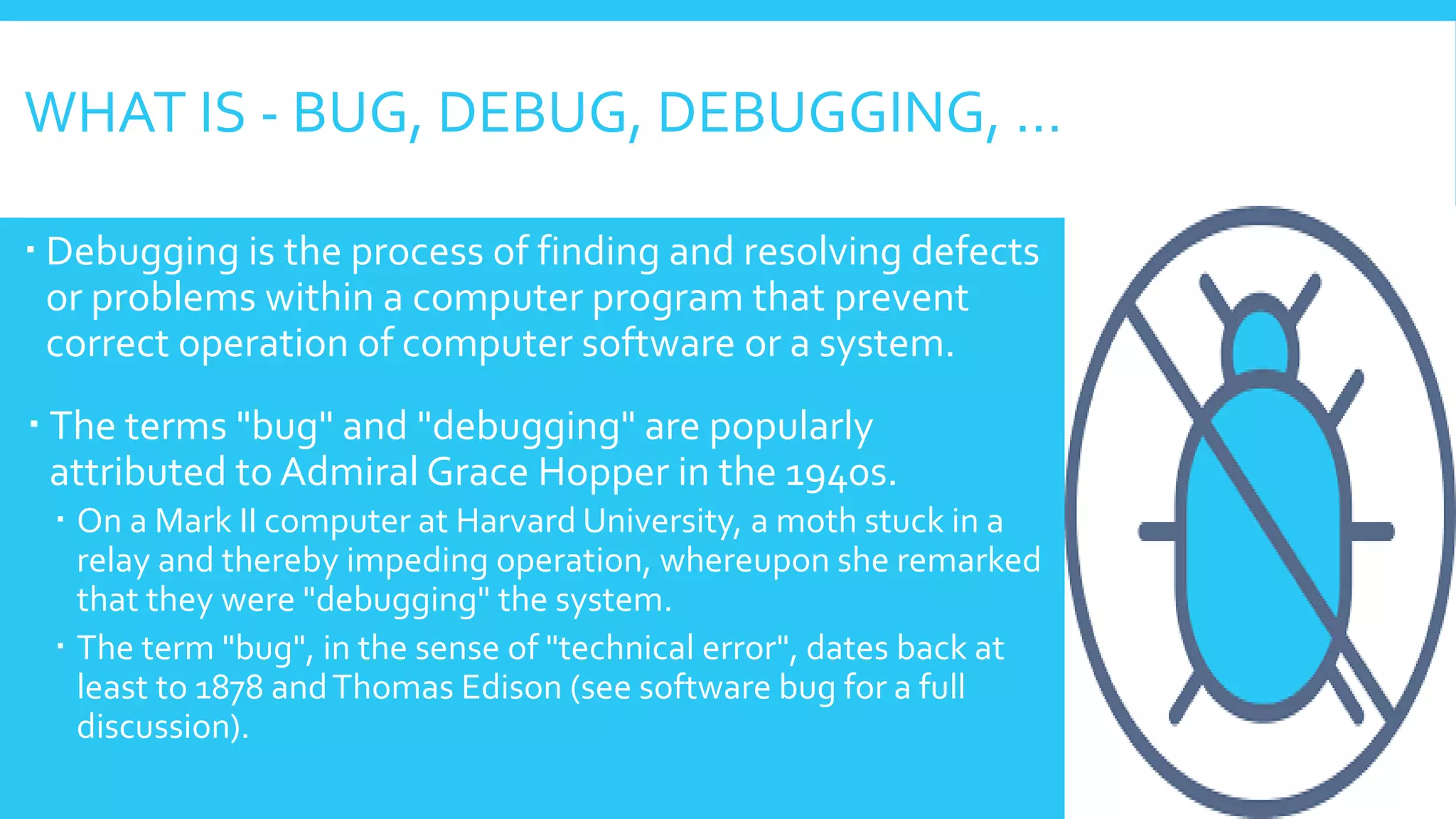


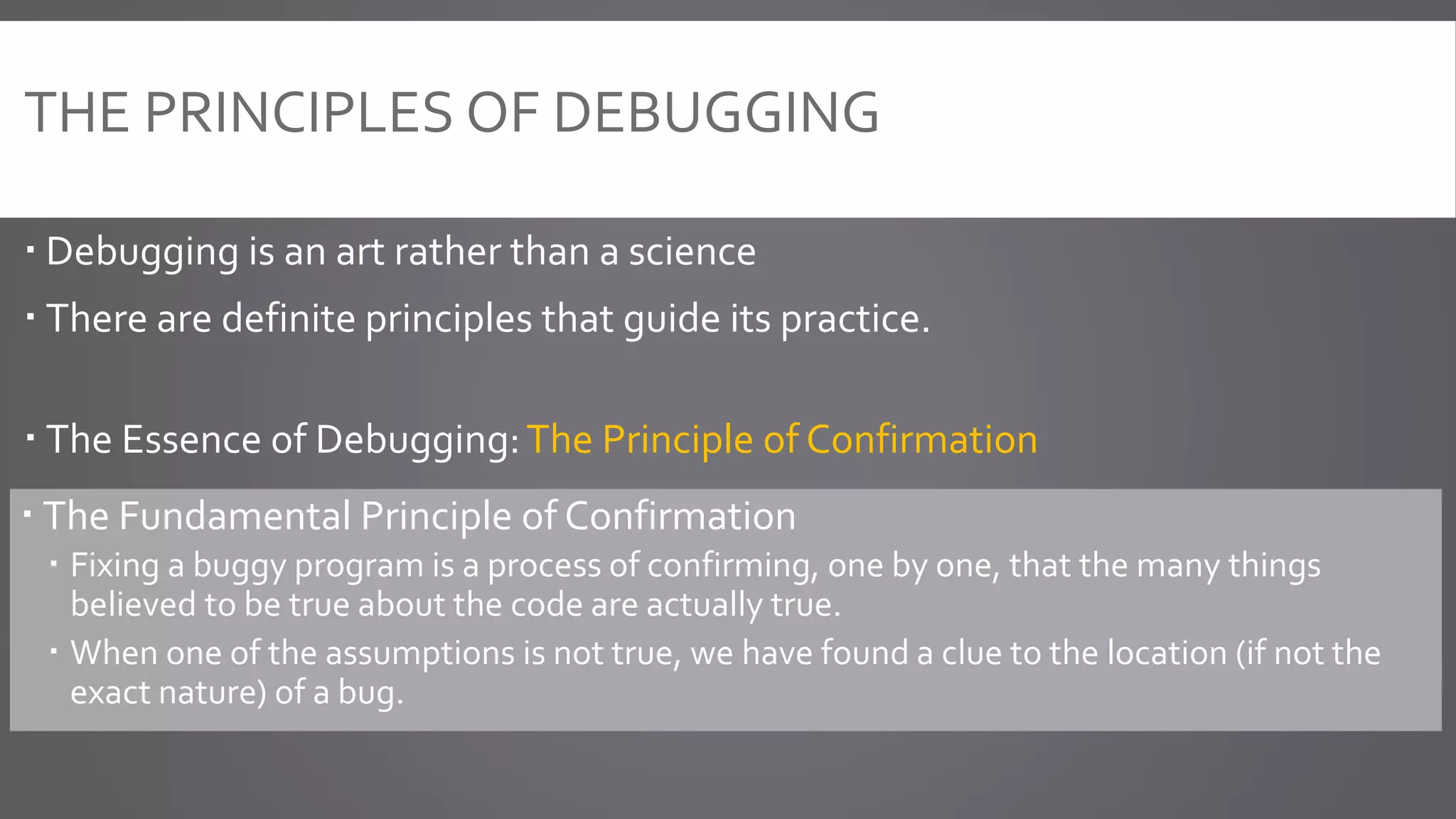
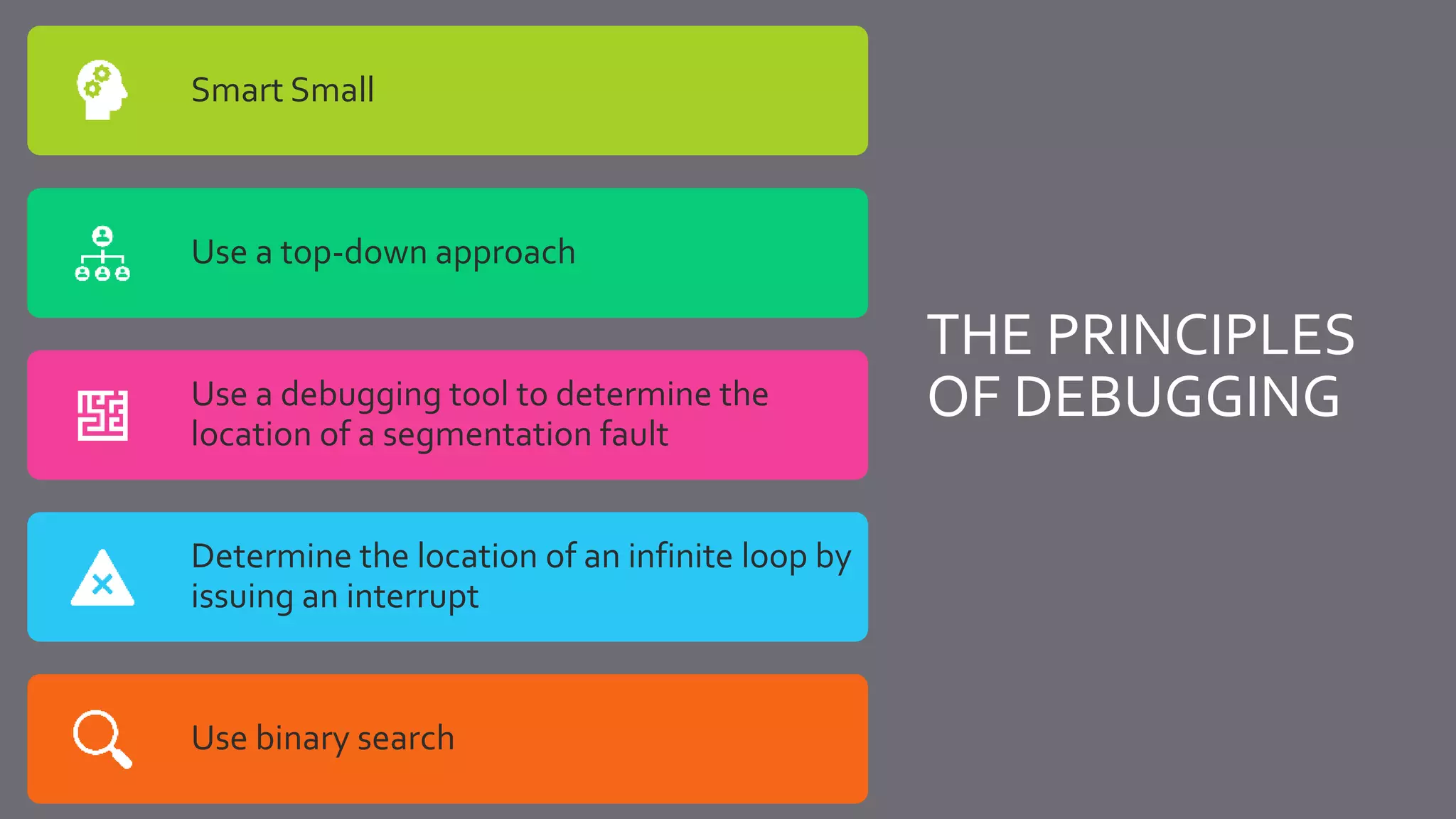

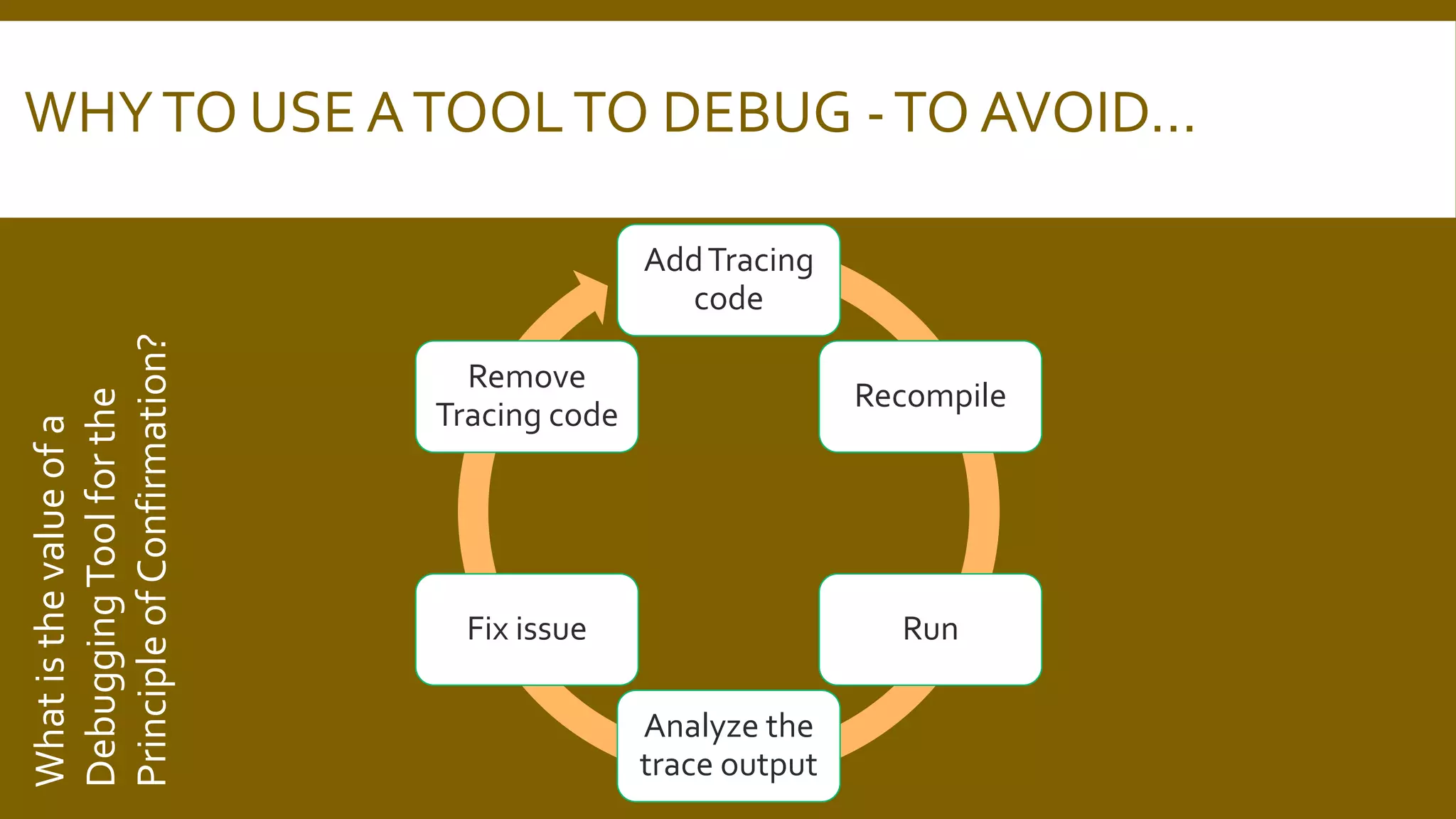
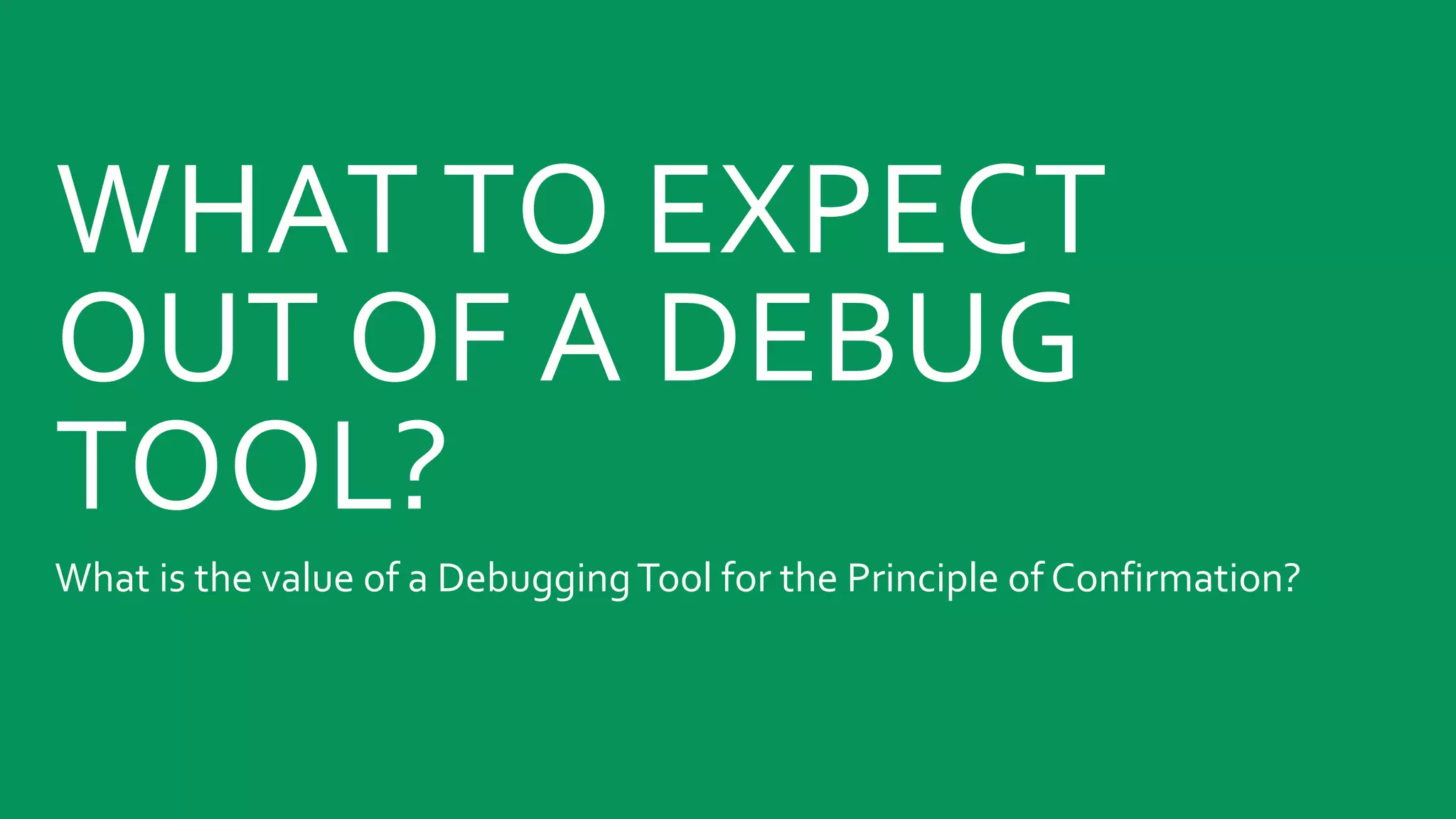
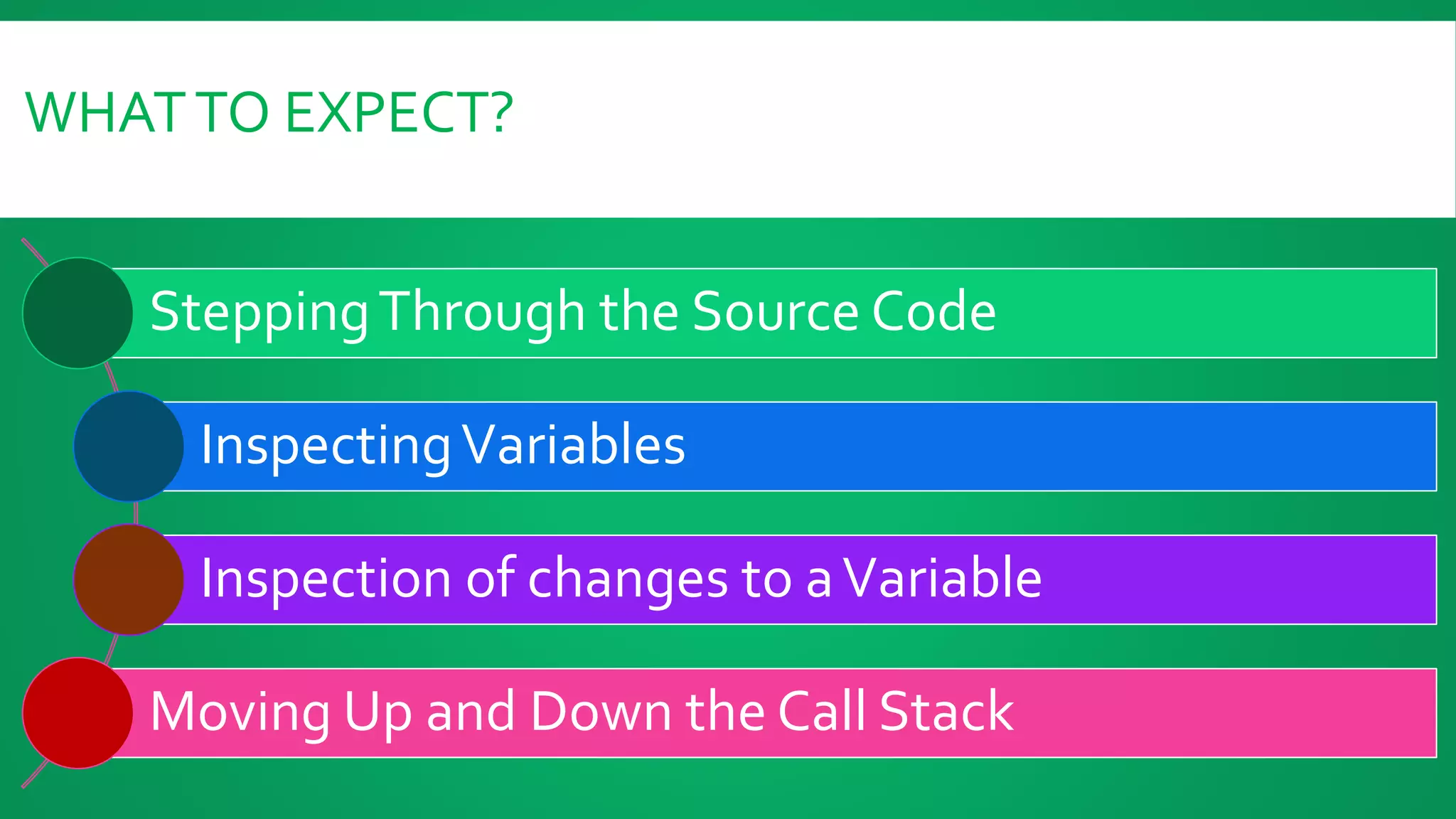

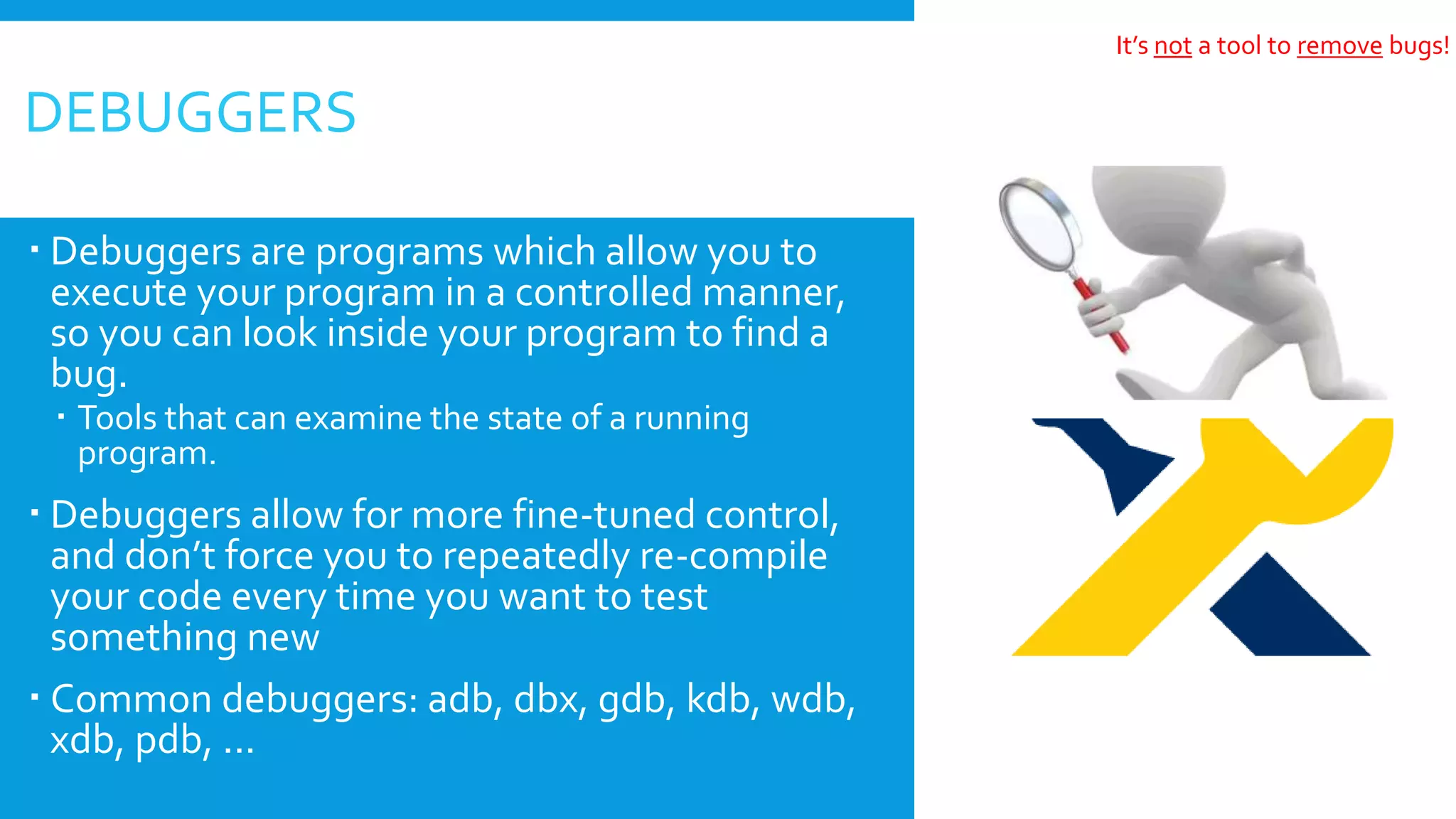
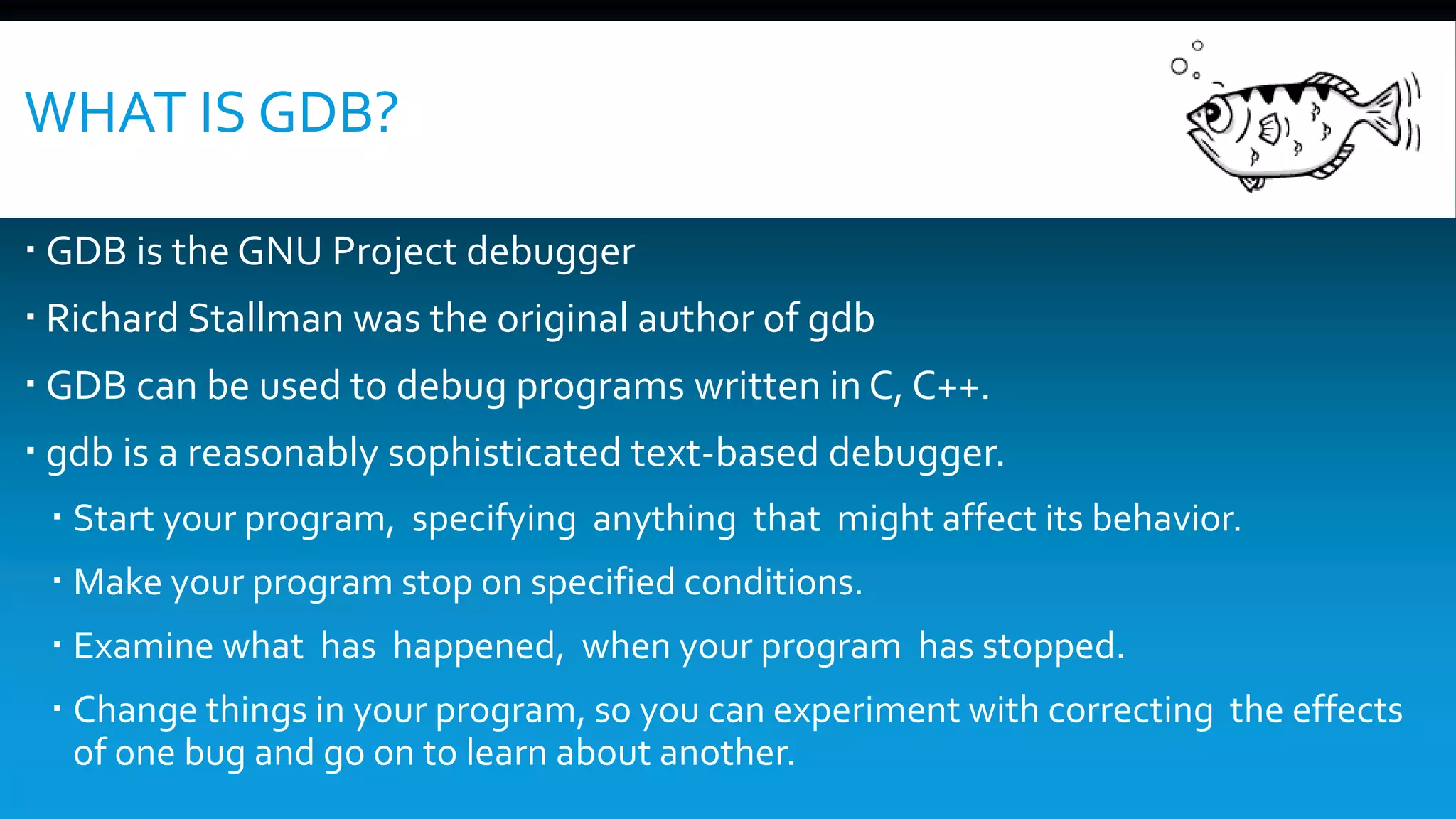

![USAGE Usage gdb [prog] [core | procID] GDB is invoked by running the program gdb. Once the debugger is started, GDB reads command until you tell it to exit. To exit gdb: quit GDB can be started with variety of arguments and options. gdb program – one argument, which is an executable file more than one arguments can be provided gdb program core – two arguments, one executable and one core file gdb program 1234 – specify process id as second argument](https://image.slidesharecdn.com/gdb-191114221051/75/Debugging-Modern-C-Application-with-Gdb-22-2048.jpg)
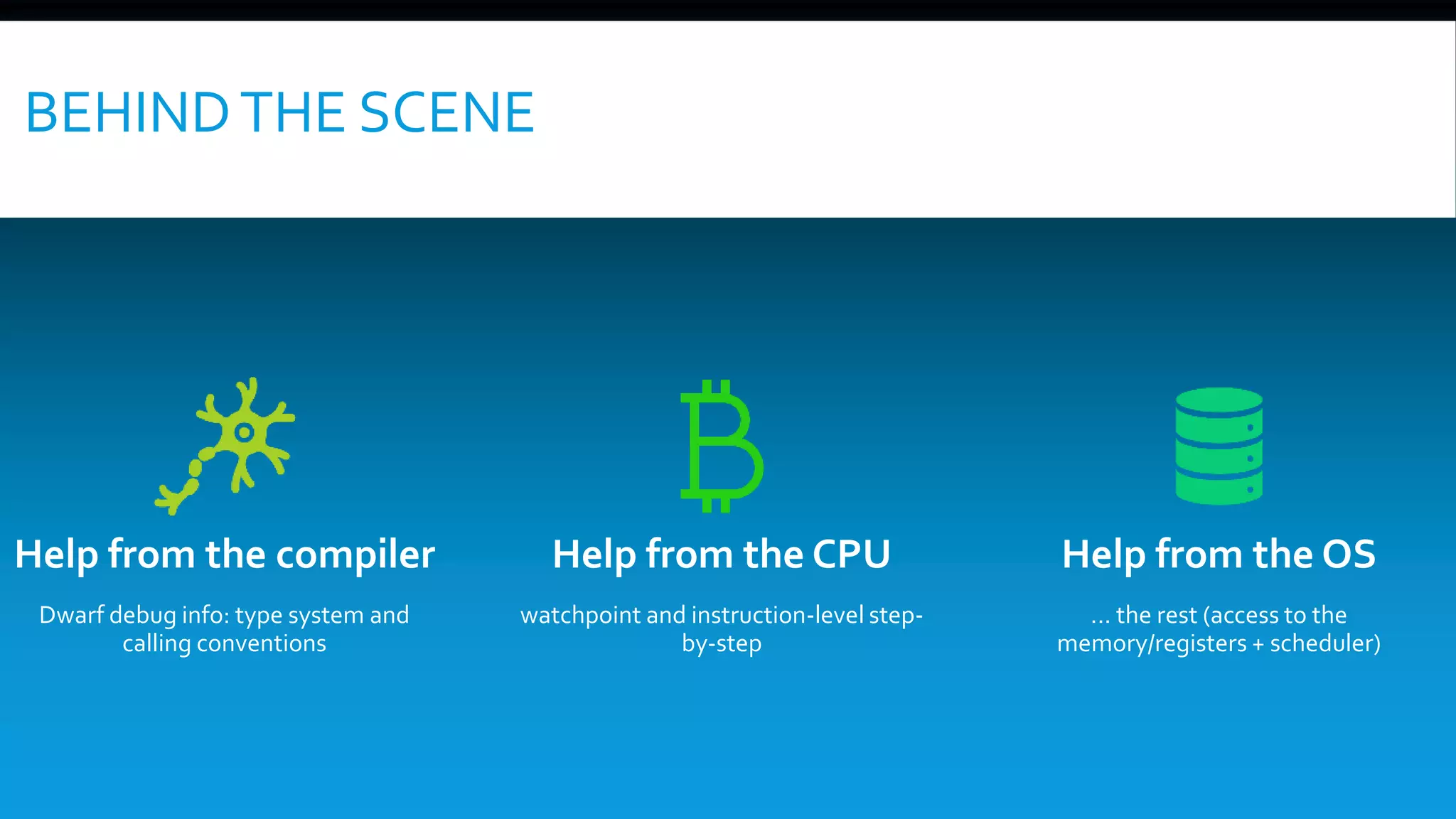
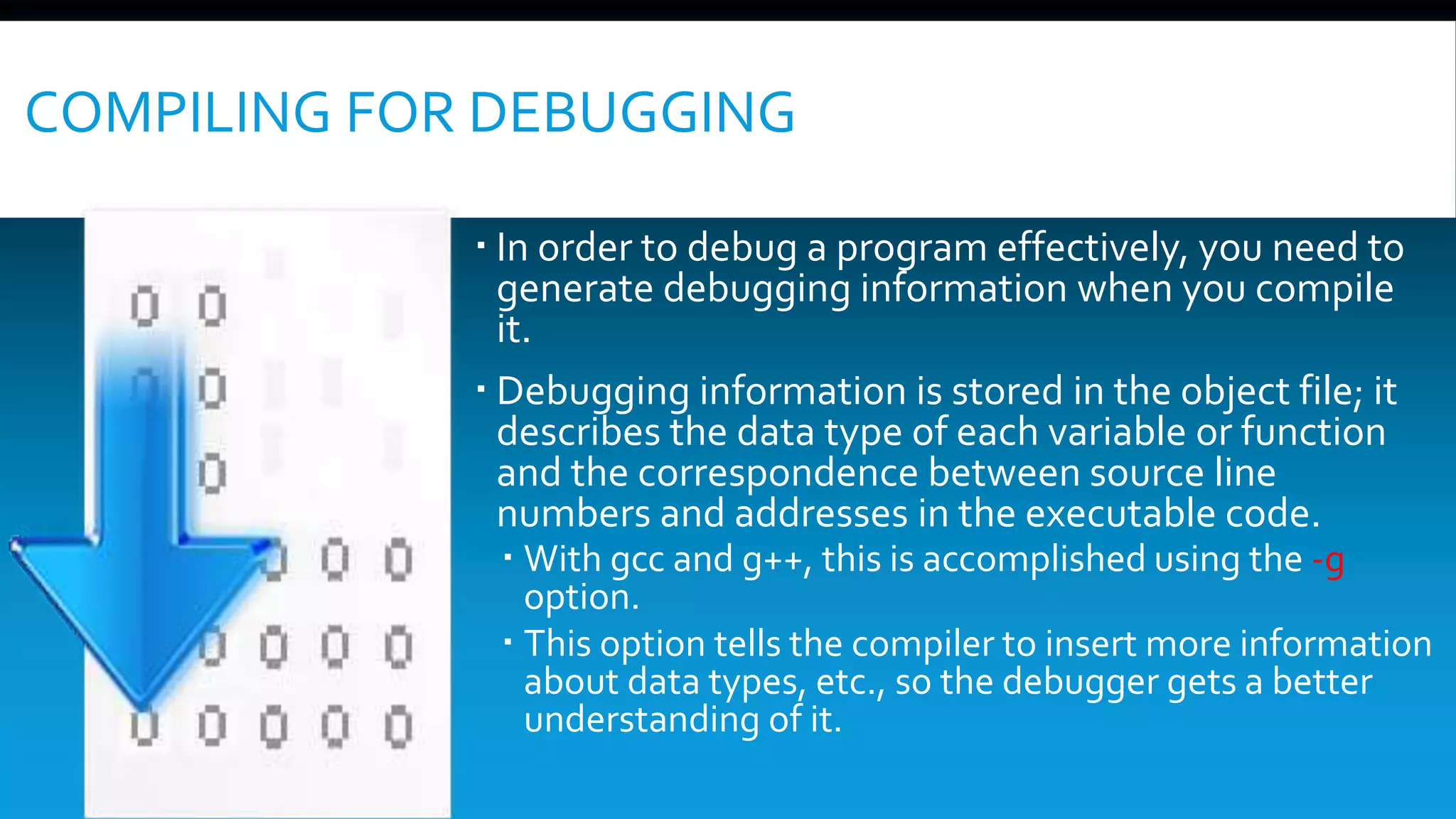
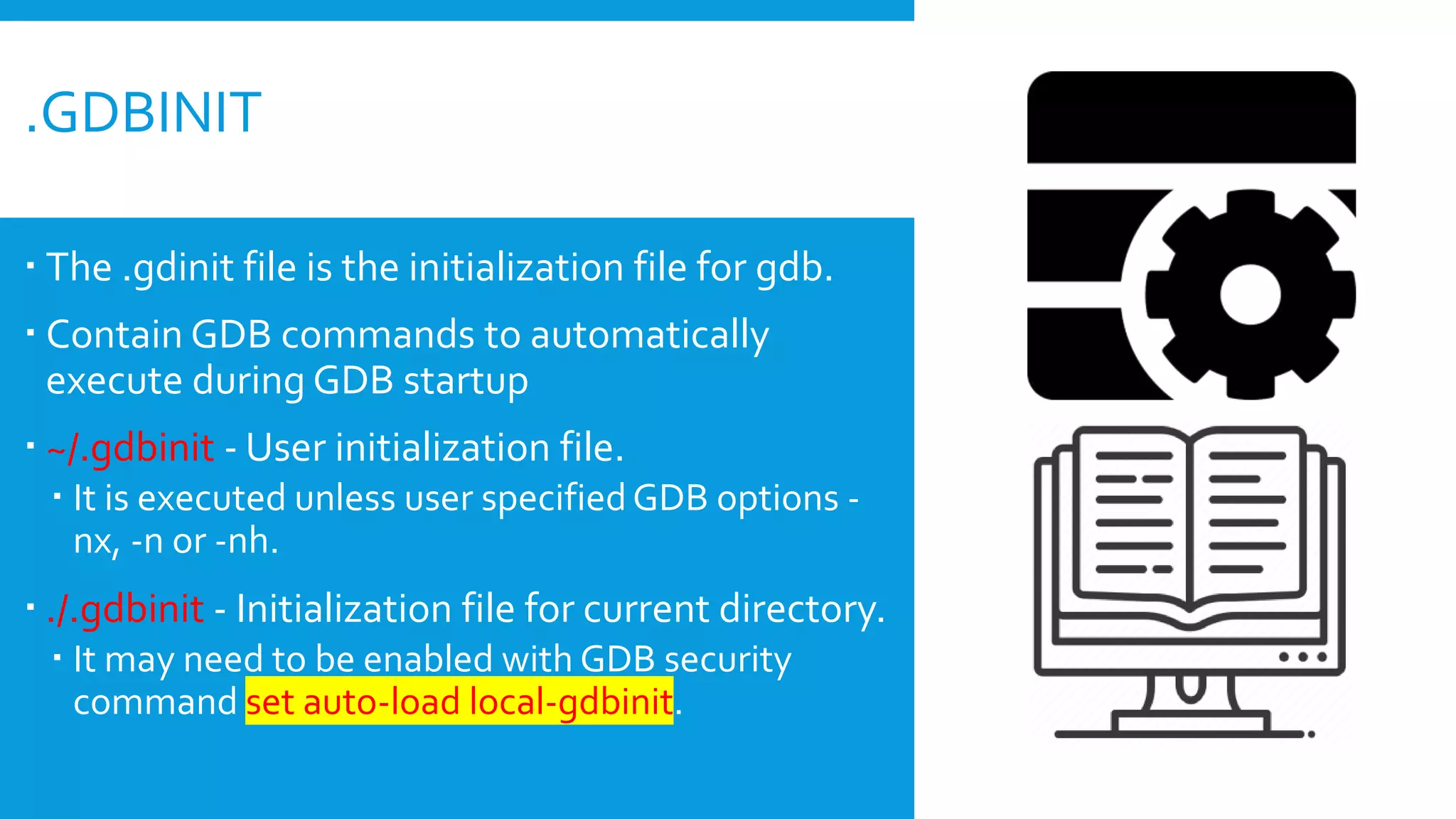
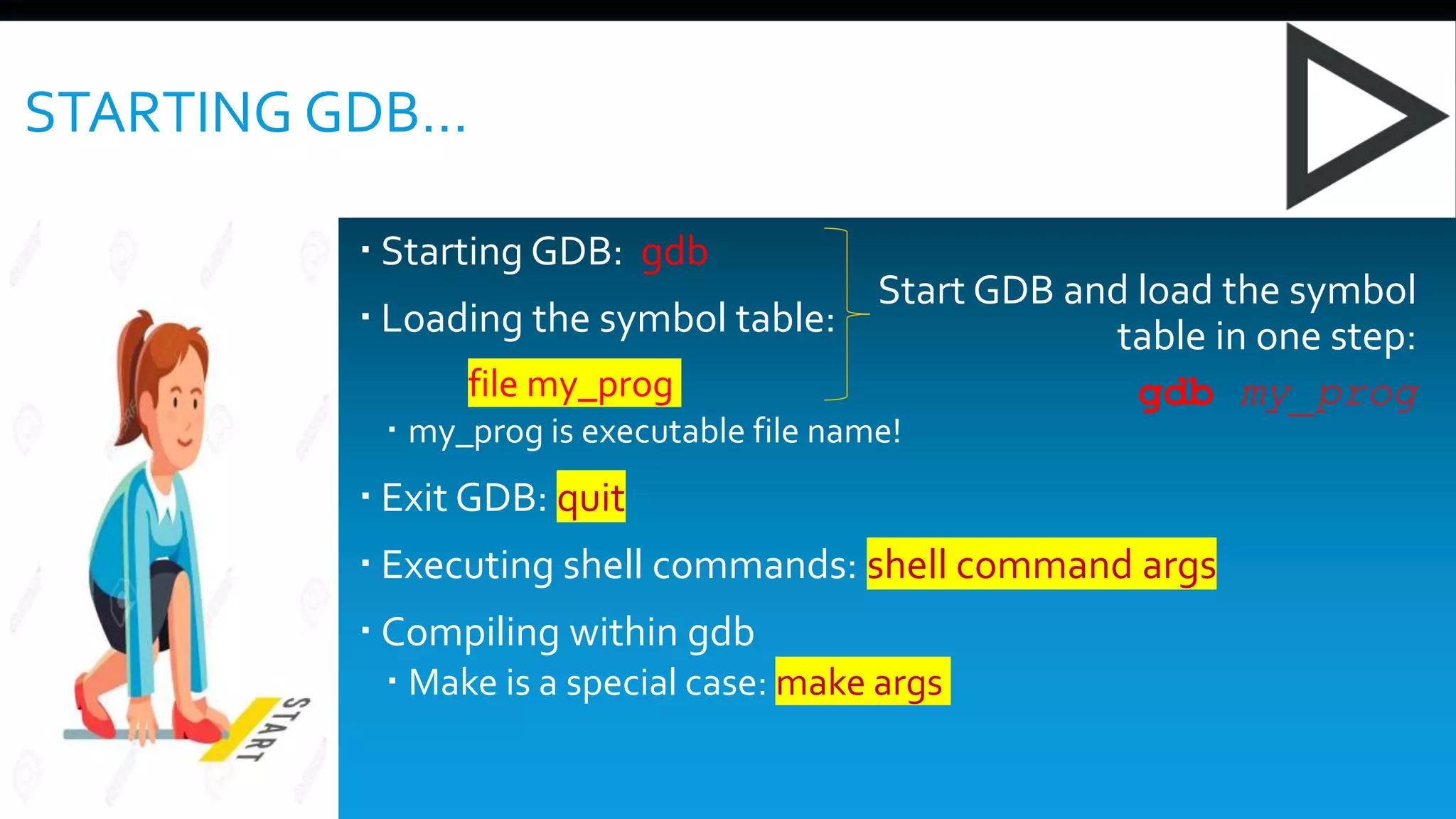
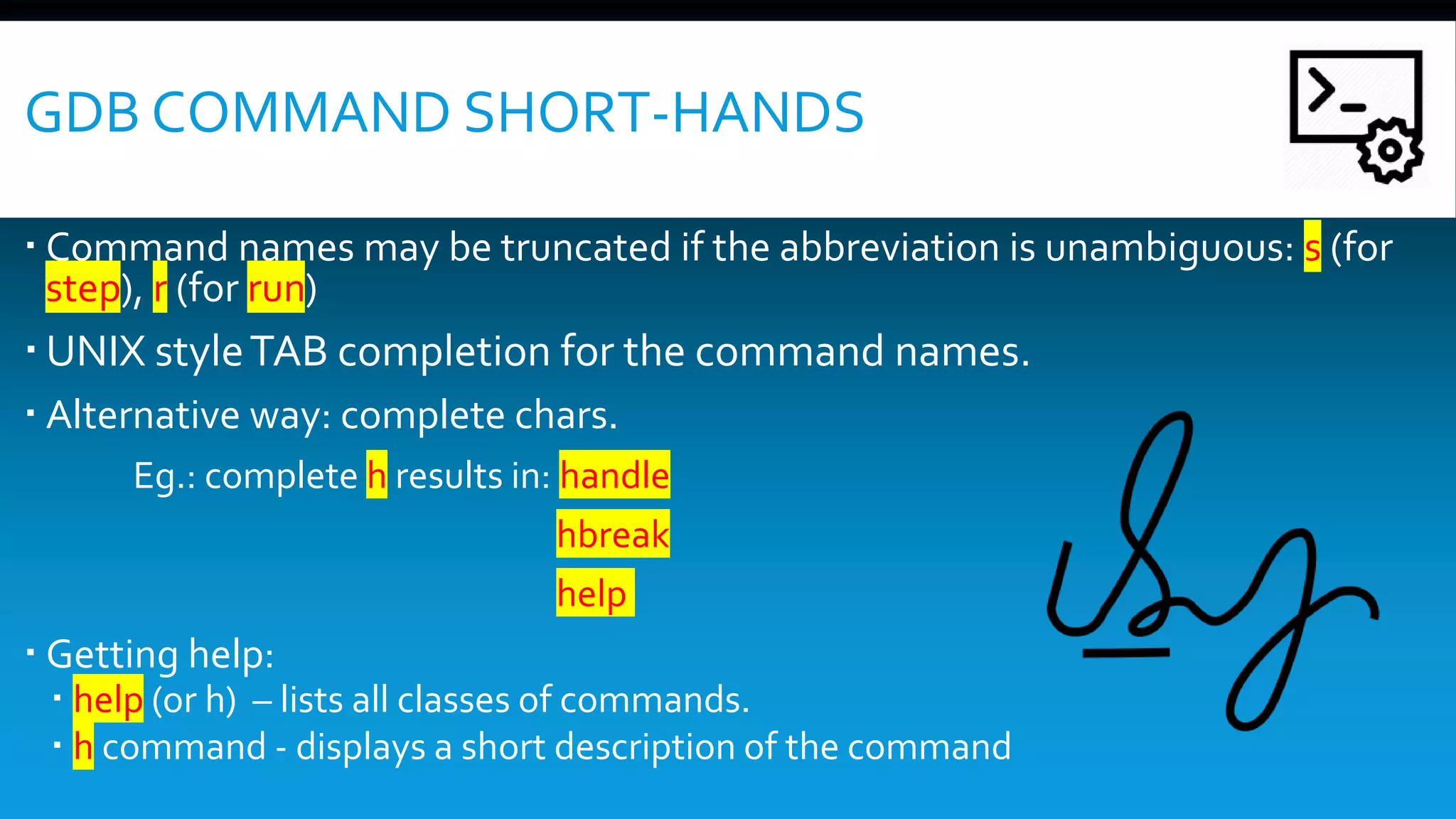
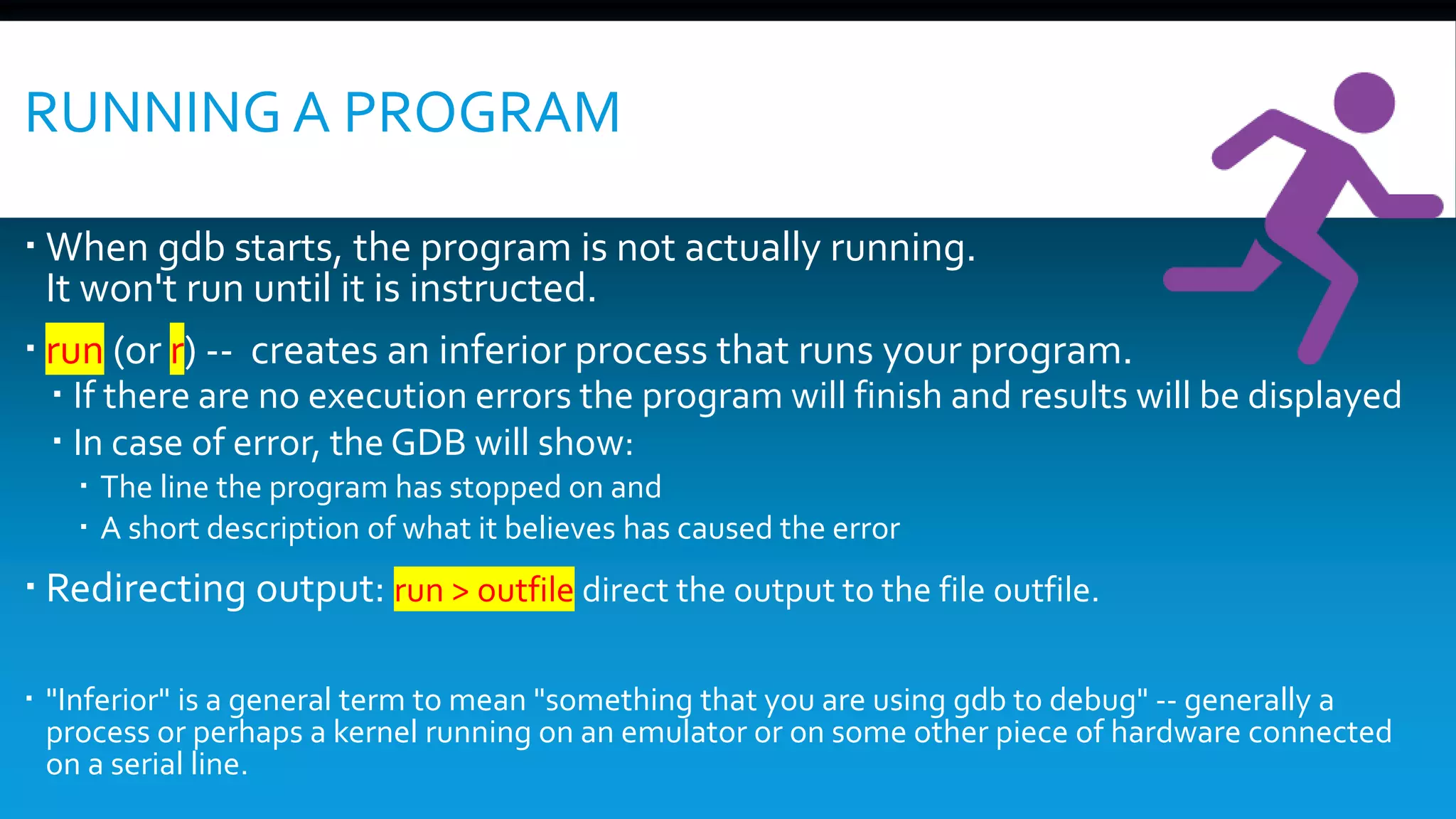
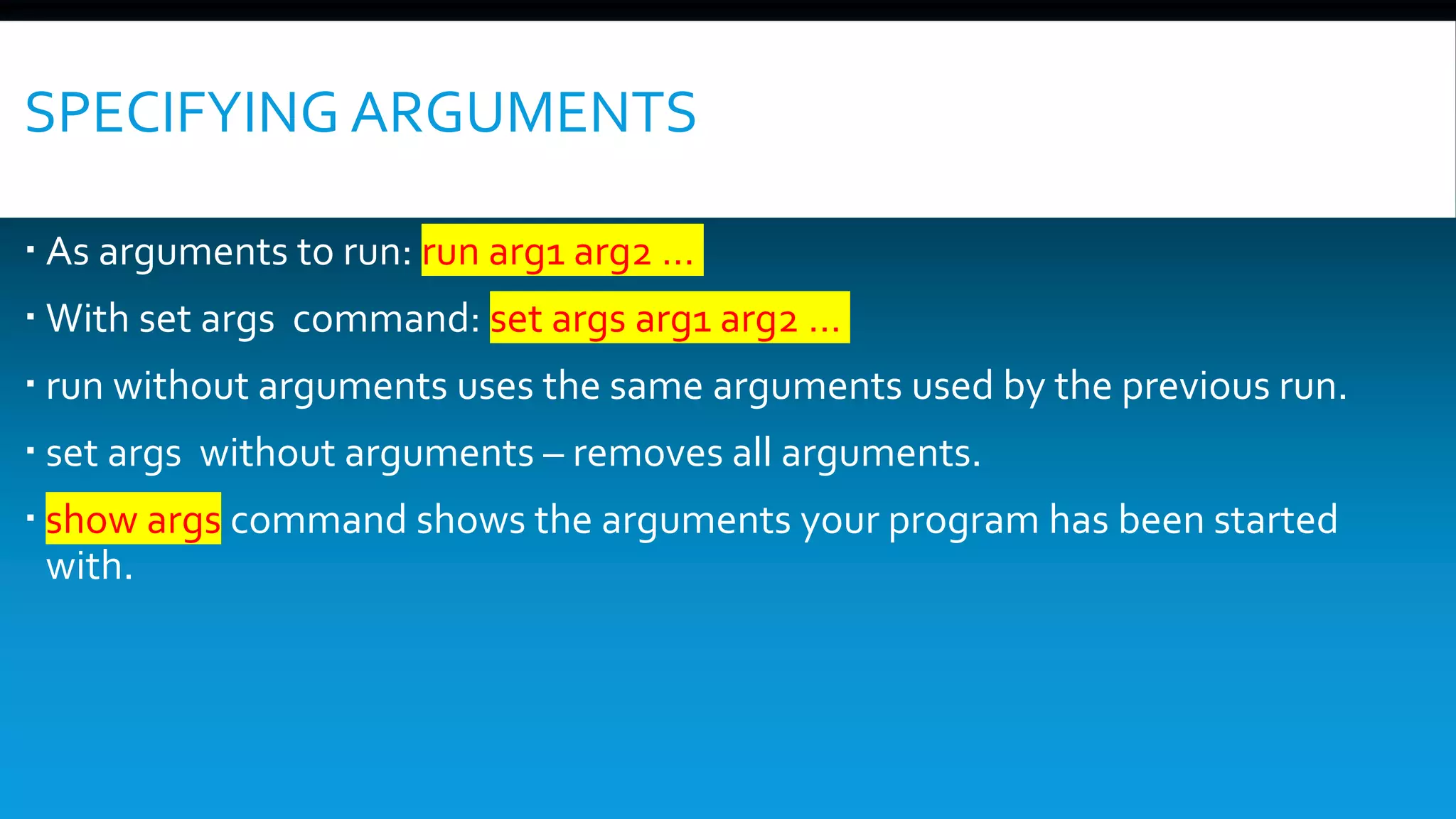
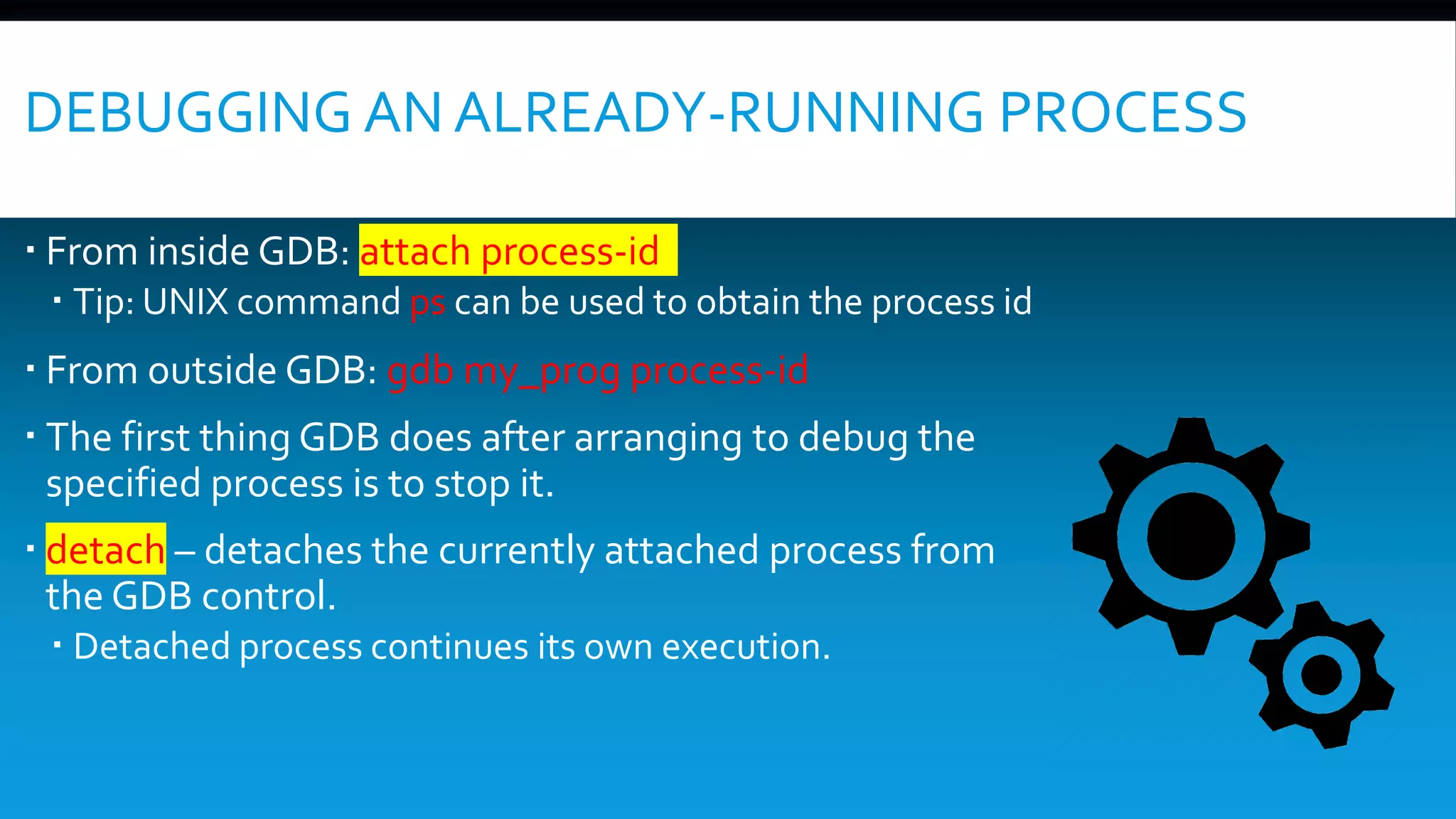
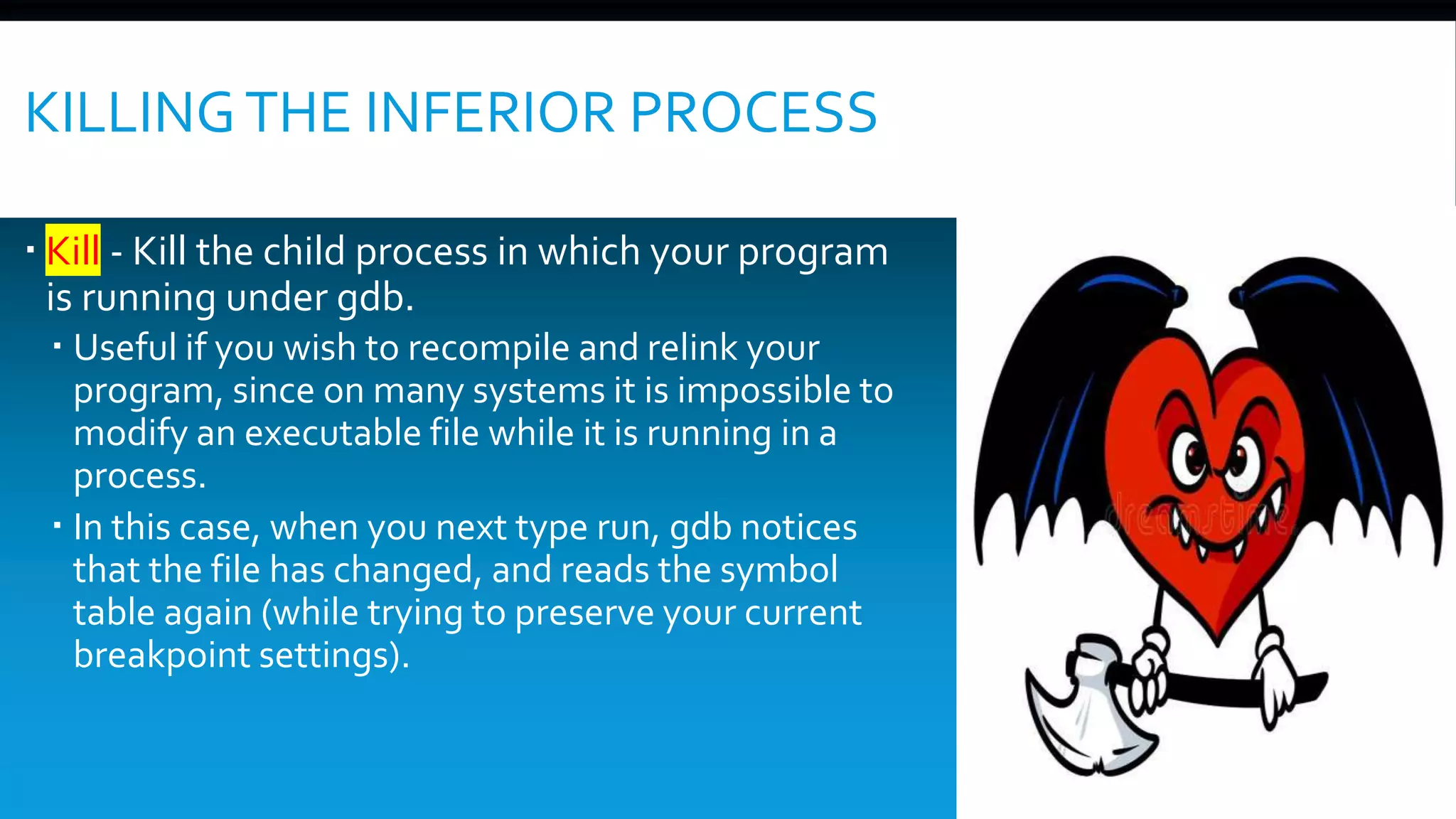
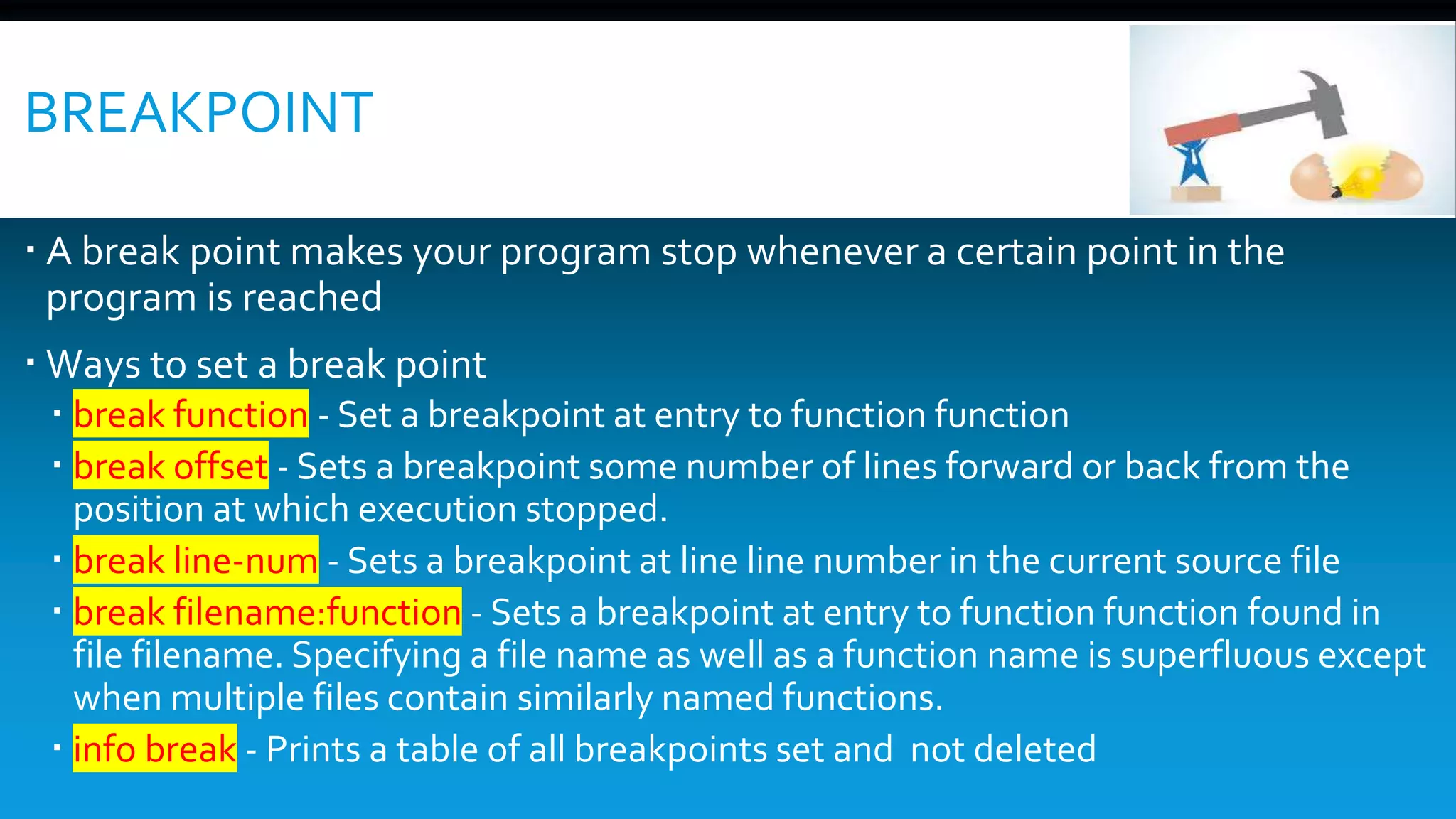
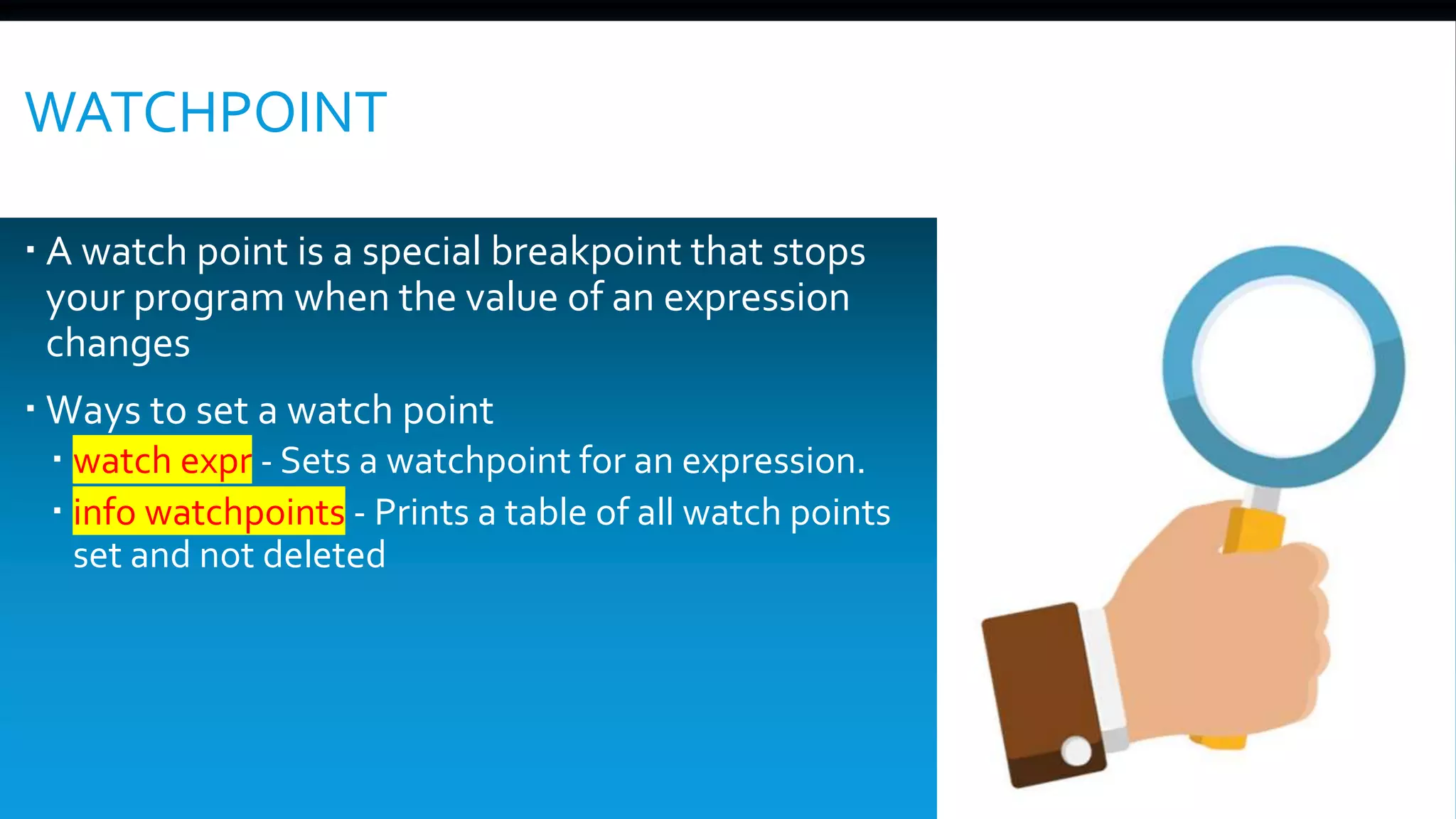
![ELIMINATE - BREAKPOINTS ANDWATCHPOINTS Eliminate a breakpoint or watchpoint once it has done its job and you no longer want your program to stop there. Based on Location clear - Delete any breakpoints at the next instruction to be executed in the selected stack frame. clear function, clear filename:function - Delete any breakpoints set at entry to the function function. clear linenum, clear filename:linenum - Delete any breakpoints set at or within the code of the specified line. Based on number delete [breakpoints] [range...] - Delete the breakpoints or watchpoints of the breakpoint ranges specified as arguments. If no argument is specified, delete all breakpoints](https://image.slidesharecdn.com/gdb-191114221051/75/Debugging-Modern-C-Application-with-Gdb-34-2048.jpg)
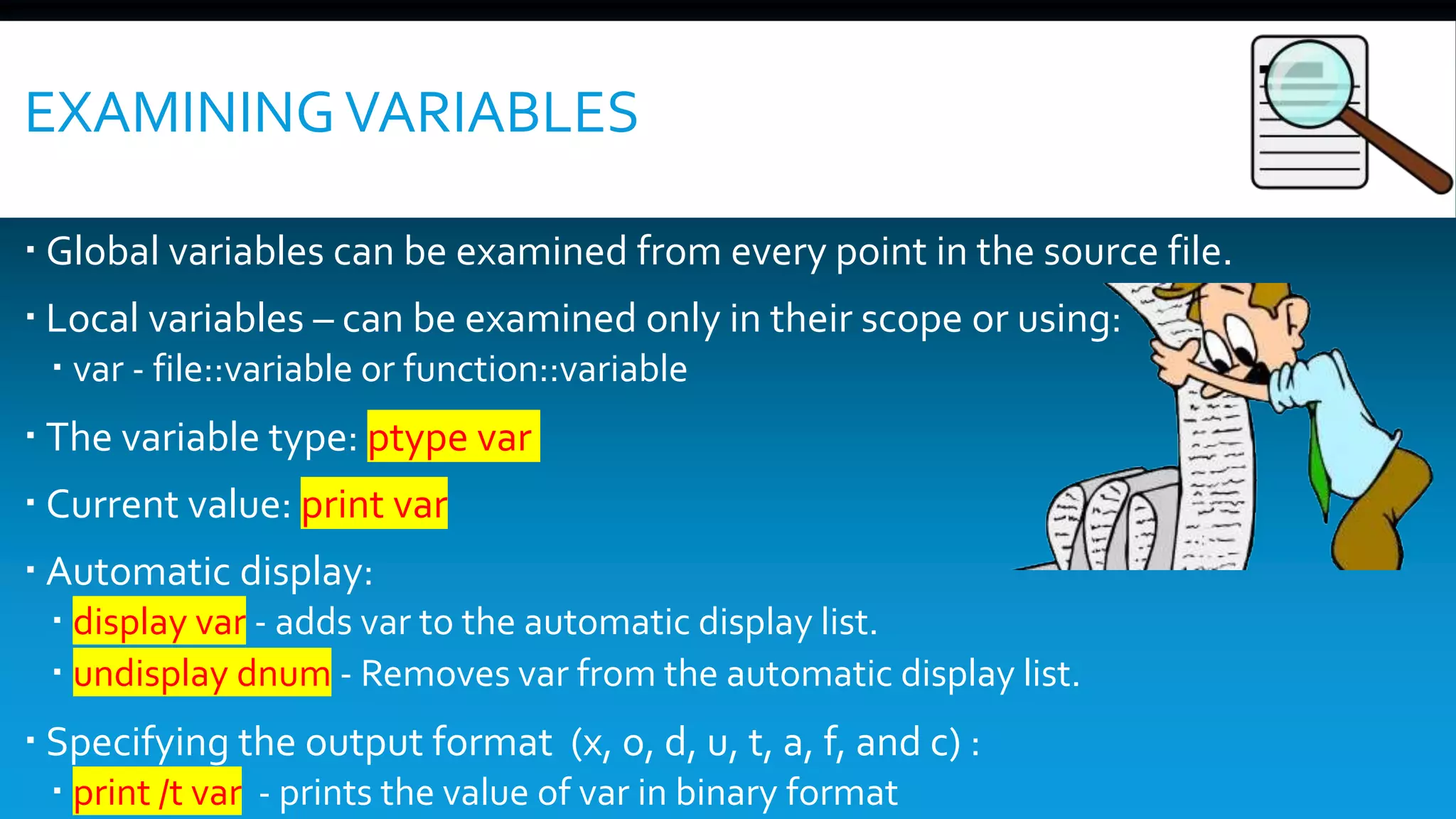
![STEPPINGTHROUGHTHE PROGRAM step [count] – program execution continue to next source line going into function calls. next [count] – program execution continue to the next source line omitting function calls. continue [ignore-count] – resume program execution ignore-count allows you to specify a further number of times to ignore a breakpoint at this location until – continue until the next source line in the current stack frame is reached. useful to exit from loops count - times step into function; next statement](https://image.slidesharecdn.com/gdb-191114221051/75/Debugging-Modern-C-Application-with-Gdb-36-2048.jpg)
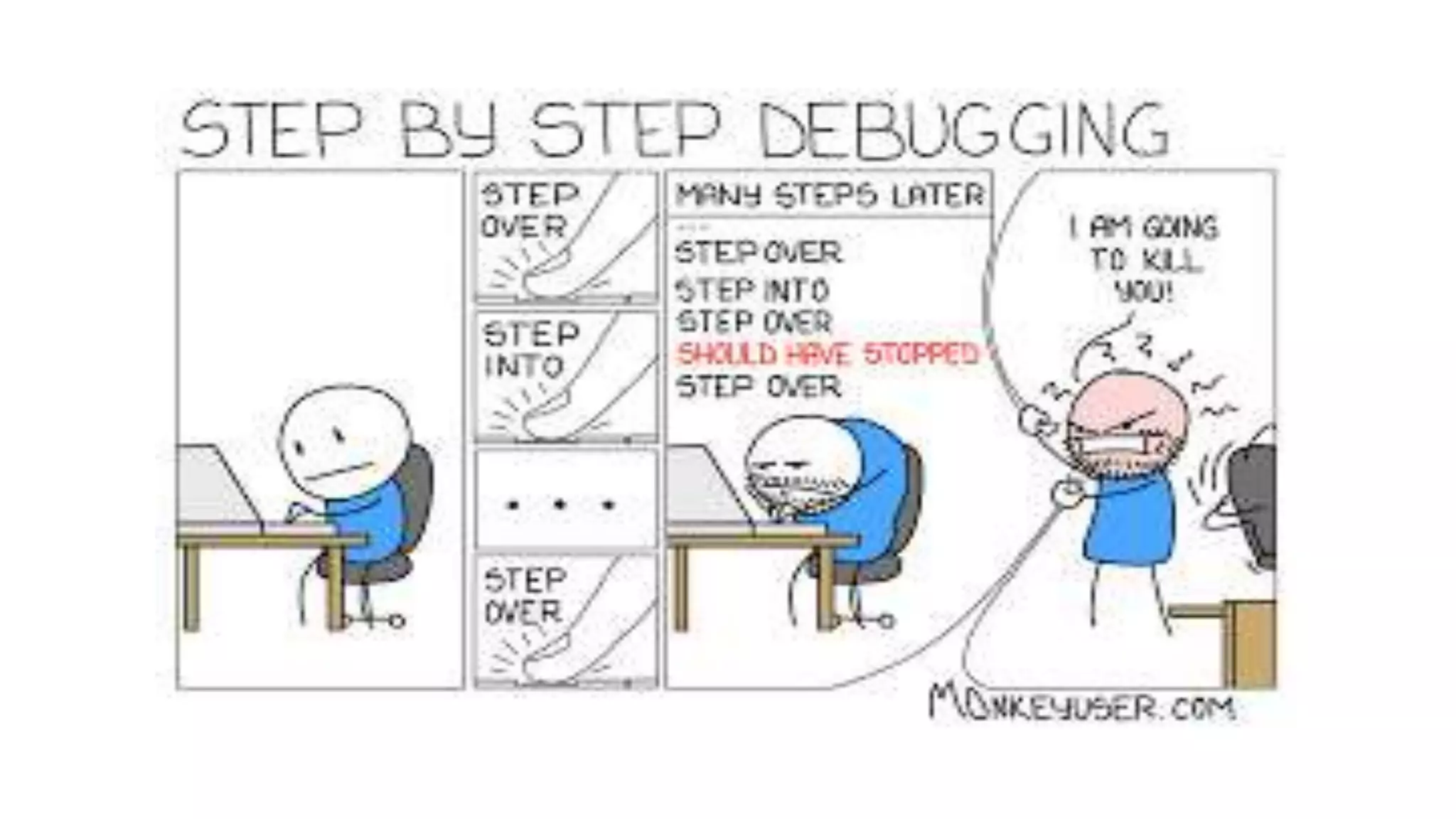
![ALTERING EXECUTION Returning from a function finish - forced return return [ret_value] – pops the current stack frame Continuing at different address: jump line_num|*address Altering the value of a variable: set <var> = <value> Proceeding to a specified point: until [line_num|*address |function_name] call <function(args)> – Invokes the function](https://image.slidesharecdn.com/gdb-191114221051/75/Debugging-Modern-C-Application-with-Gdb-38-2048.jpg)
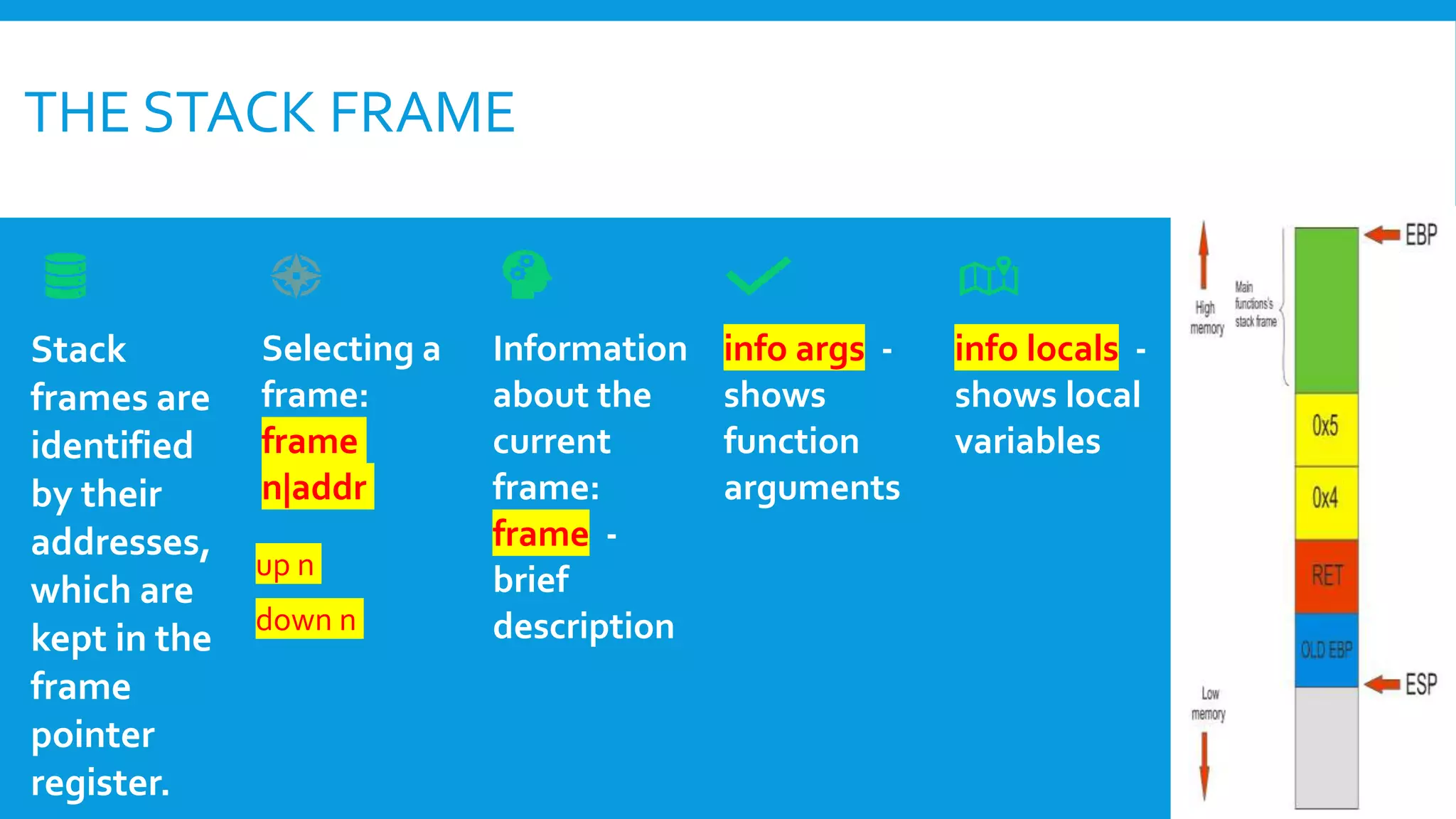
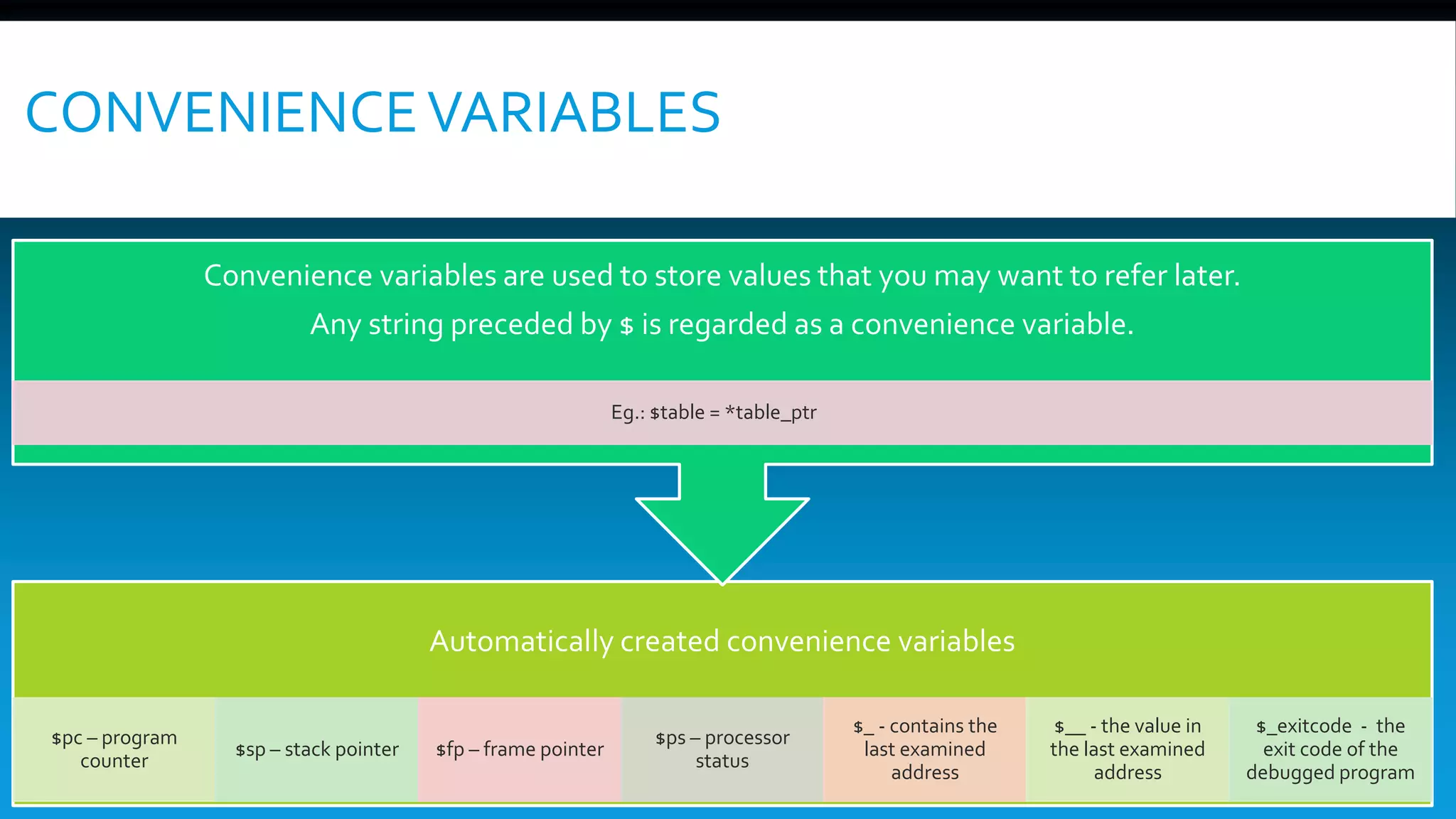
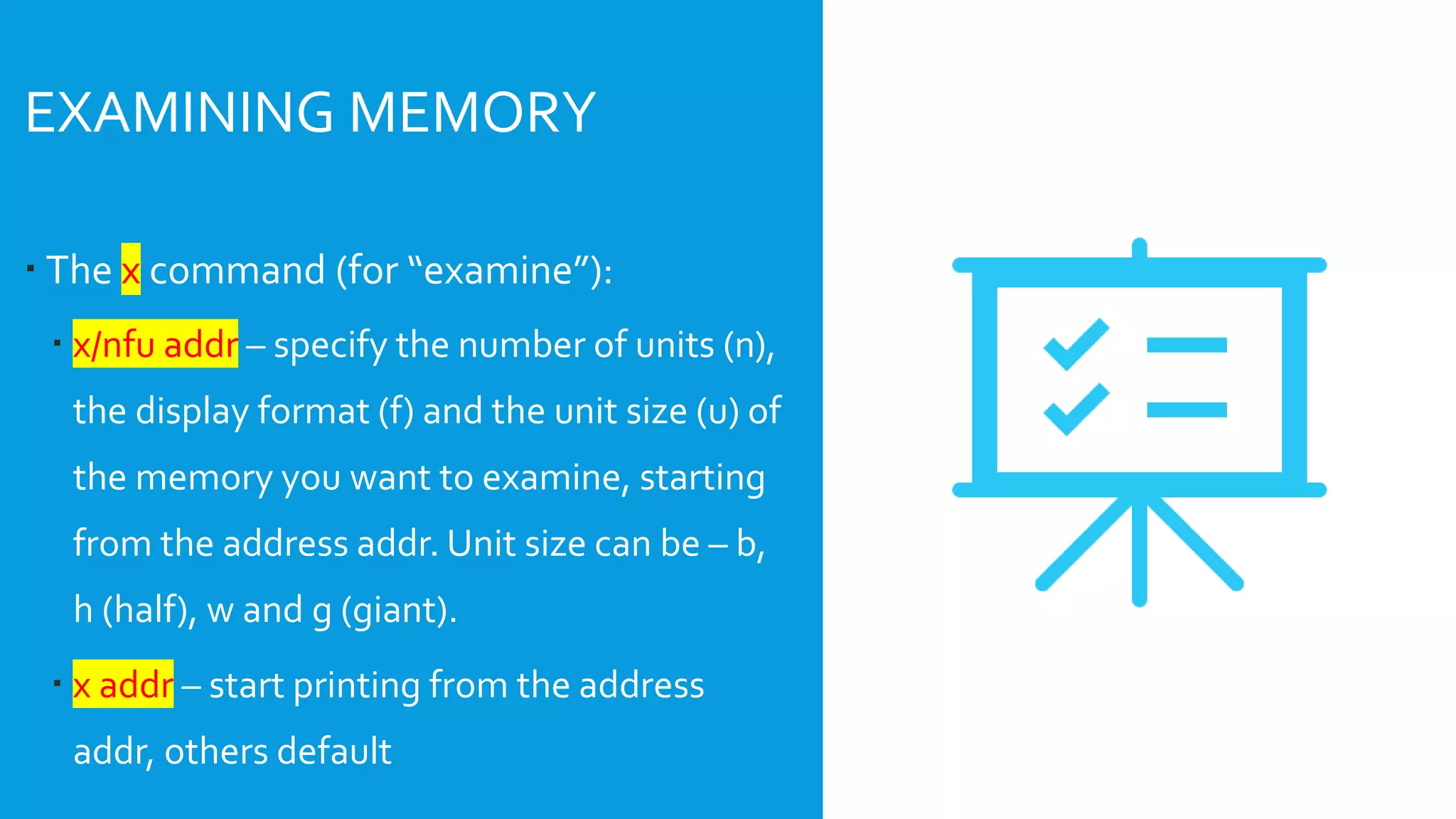
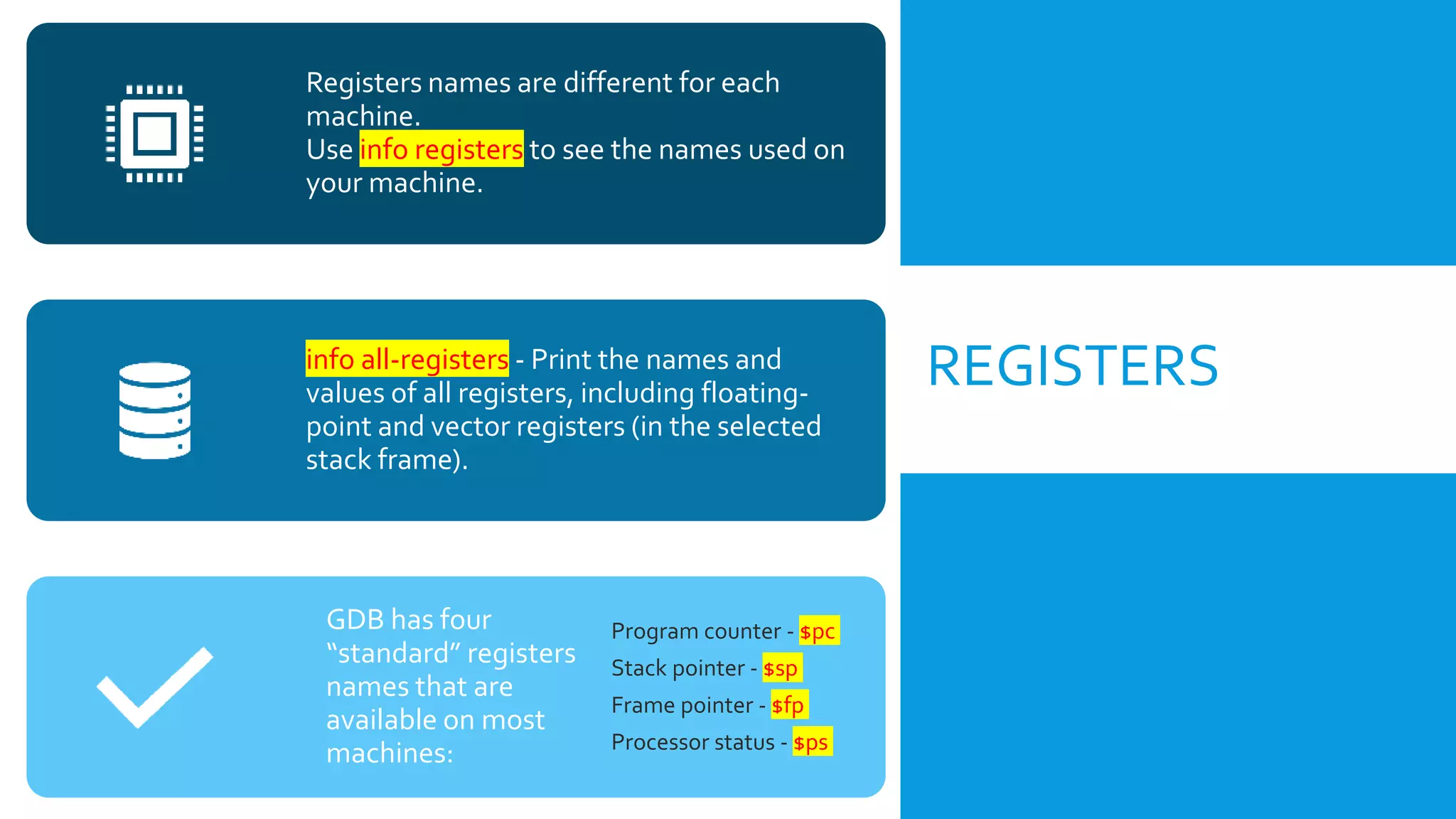
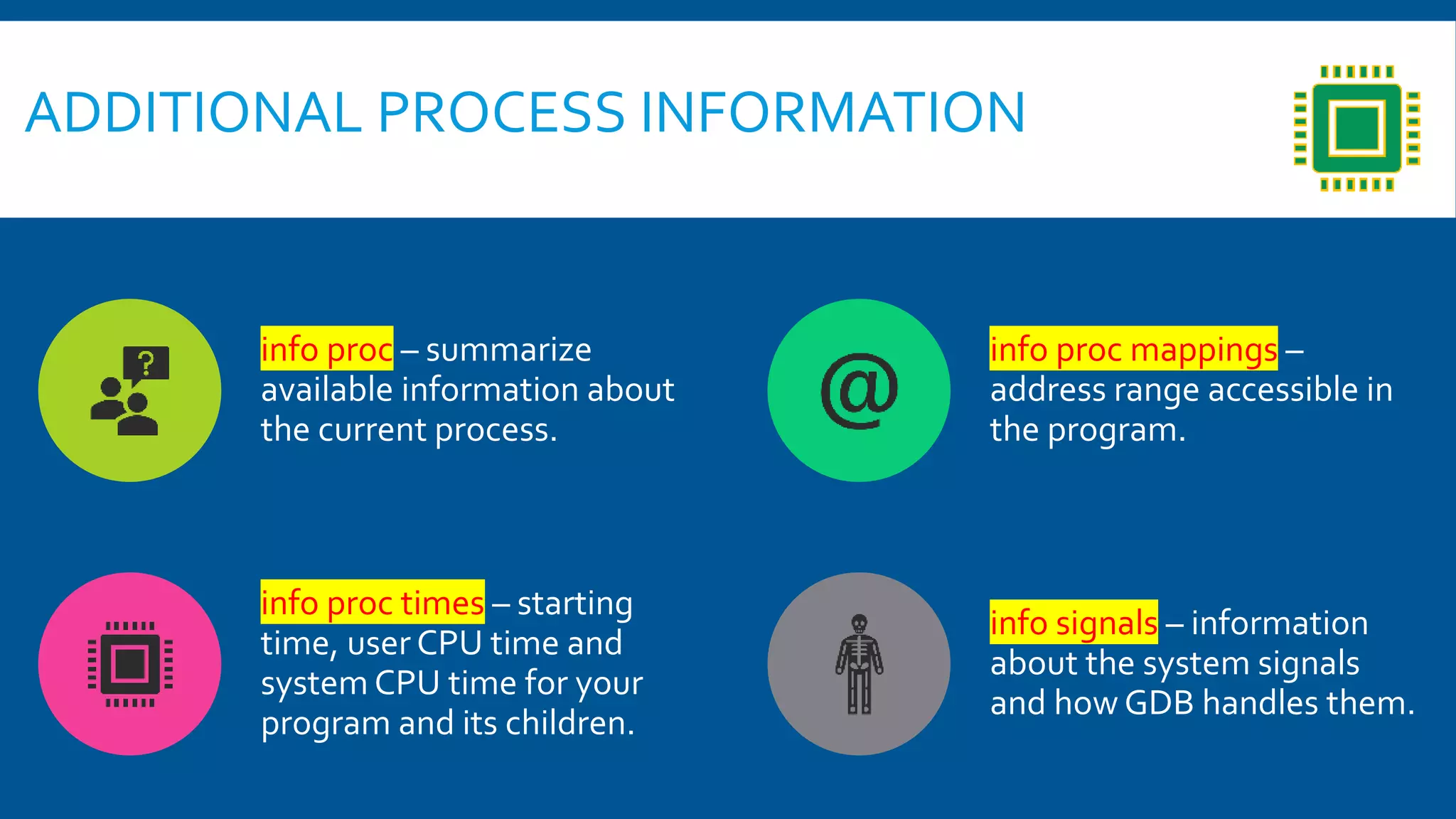
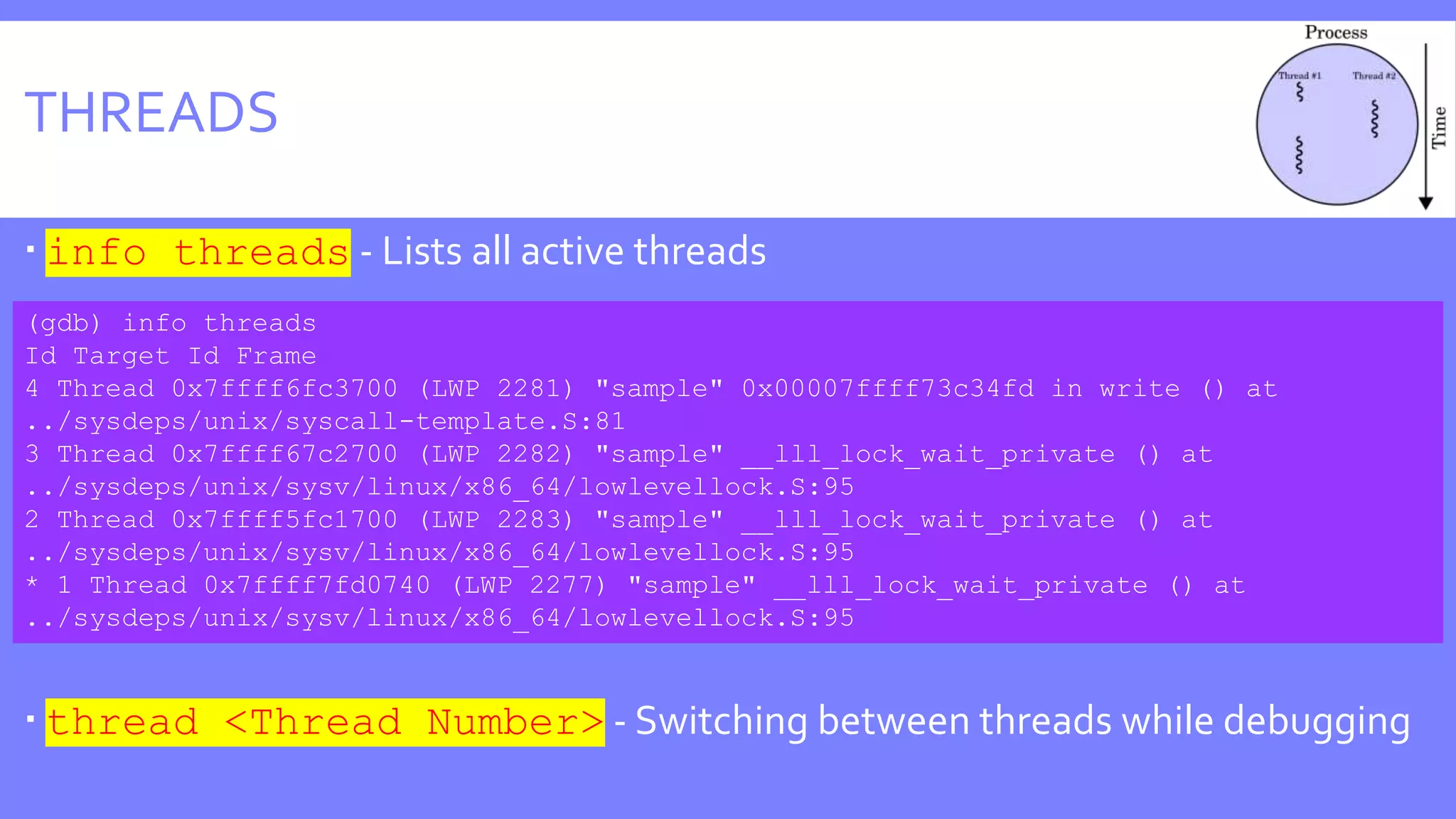
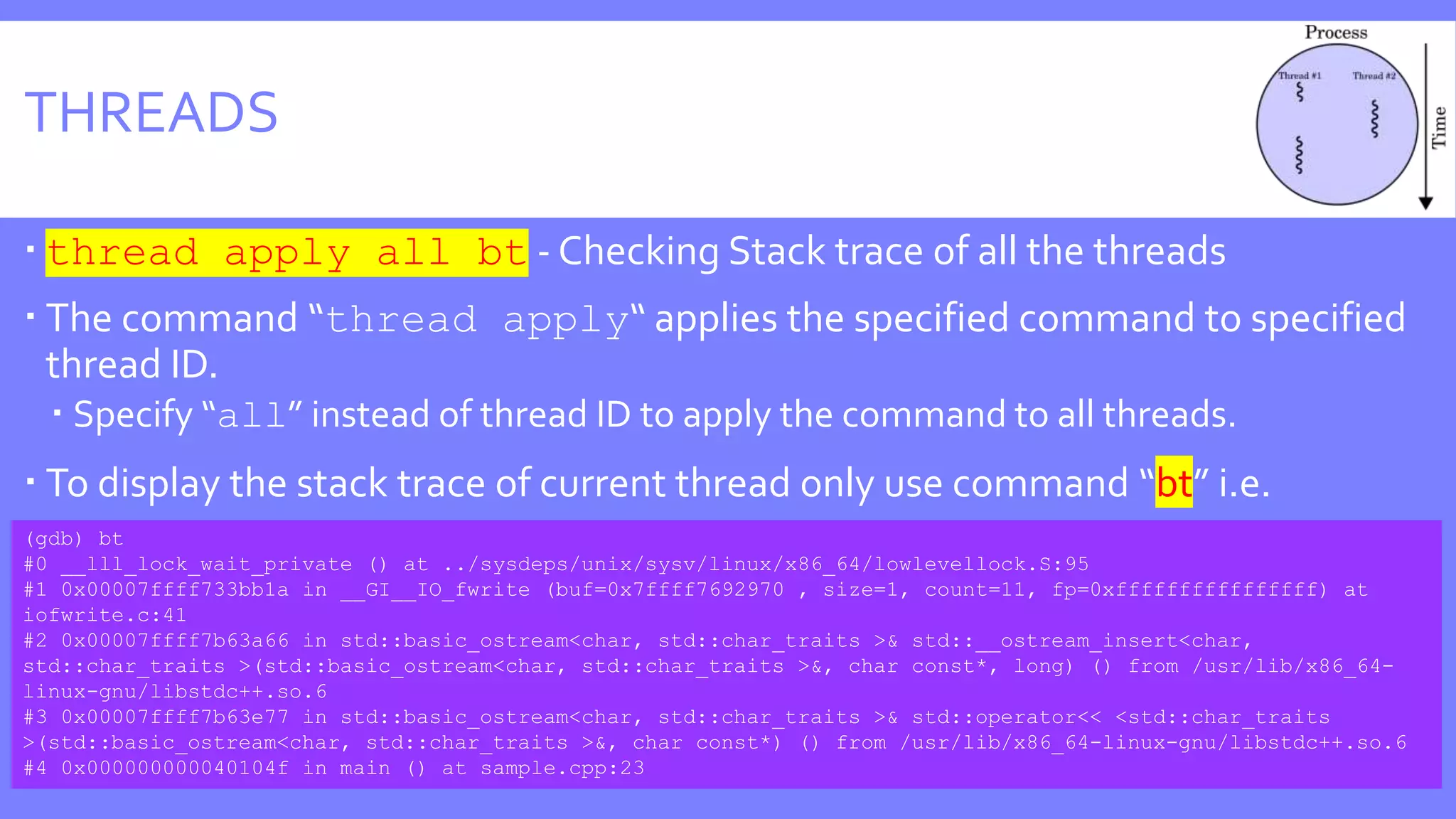
![POSTMORTEM DEBUGGING – CORE A core file or core dump is a file that records the memory image of a running process and its process status (register values etc.). Its primary use is post-mortem debugging of a program that crashed while it ran outside a debugger. A program that crashes automatically produces a core file, unless this feature is disabled by the user. Occasionally, you may wish to produce a core file of the program you are debugging in order to preserve a snapshot of its state. gdb has a special command for that generate-core-file. gcore [file] Produce a core dump of the inferior process.The optional argument file specifies the file name where to put the core dump. If not specified, the file name defaults to ‘core.pid’, where pid is the inferior process ID.](https://image.slidesharecdn.com/gdb-191114221051/75/Debugging-Modern-C-Application-with-Gdb-46-2048.jpg)
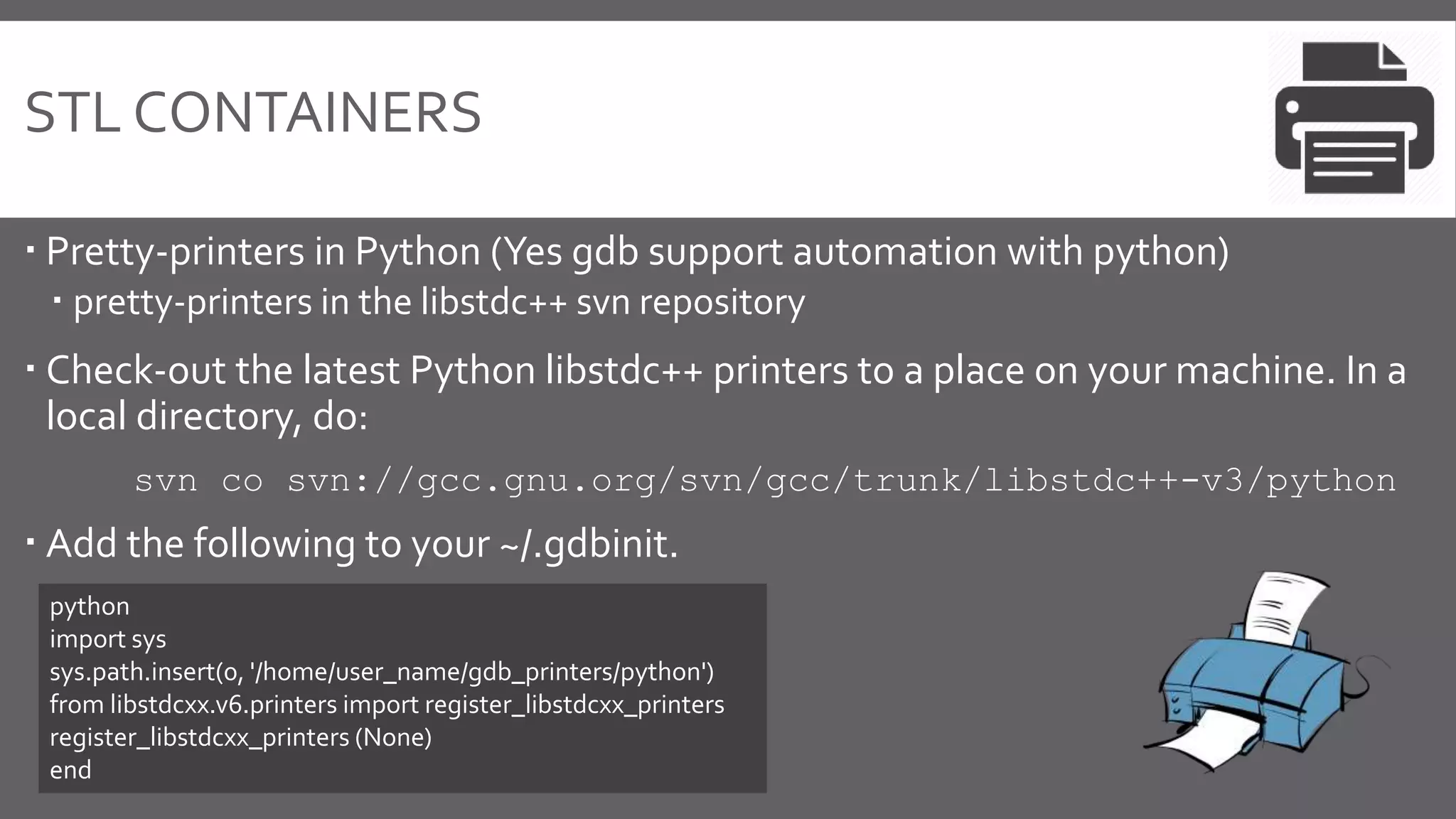
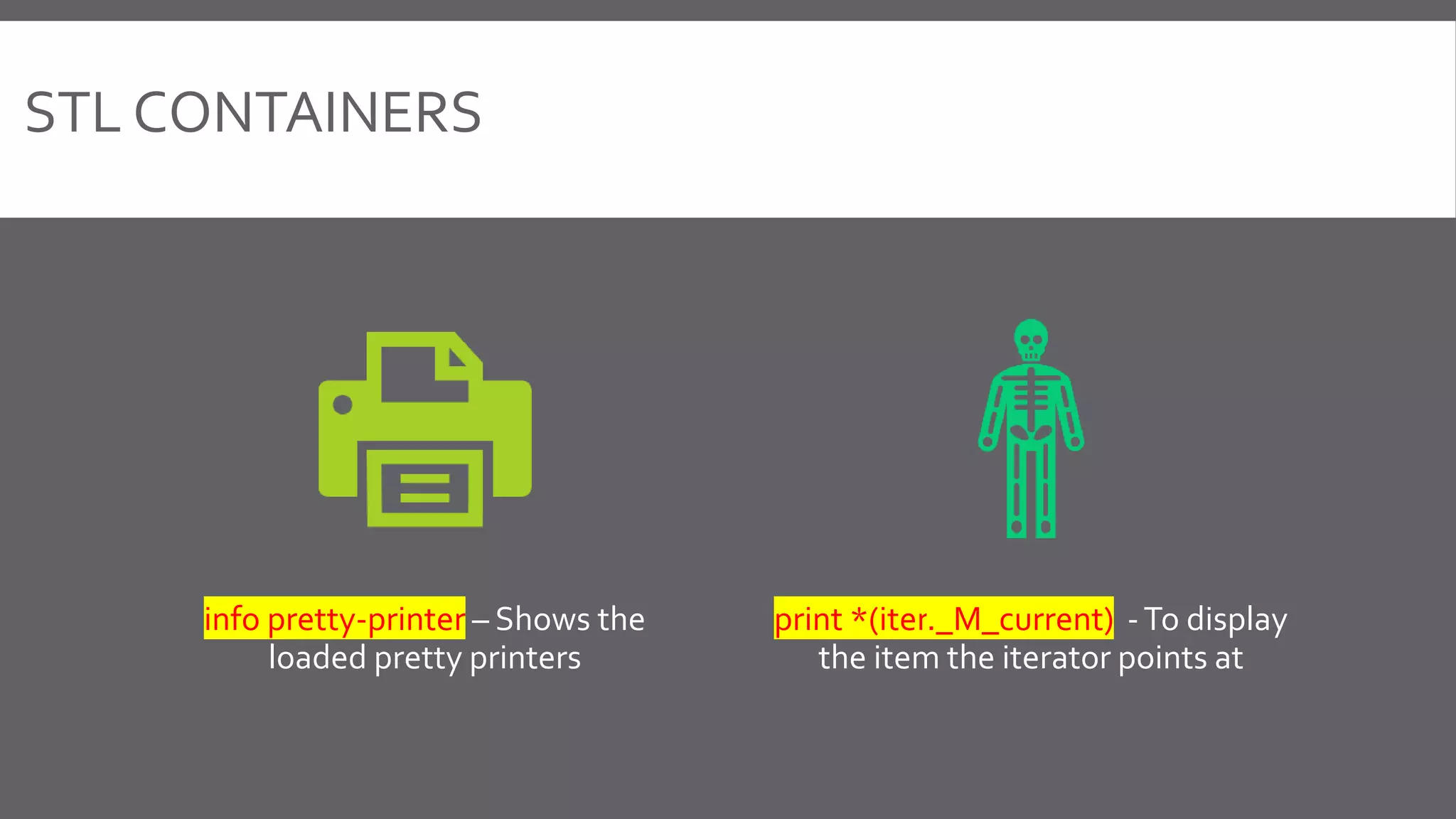
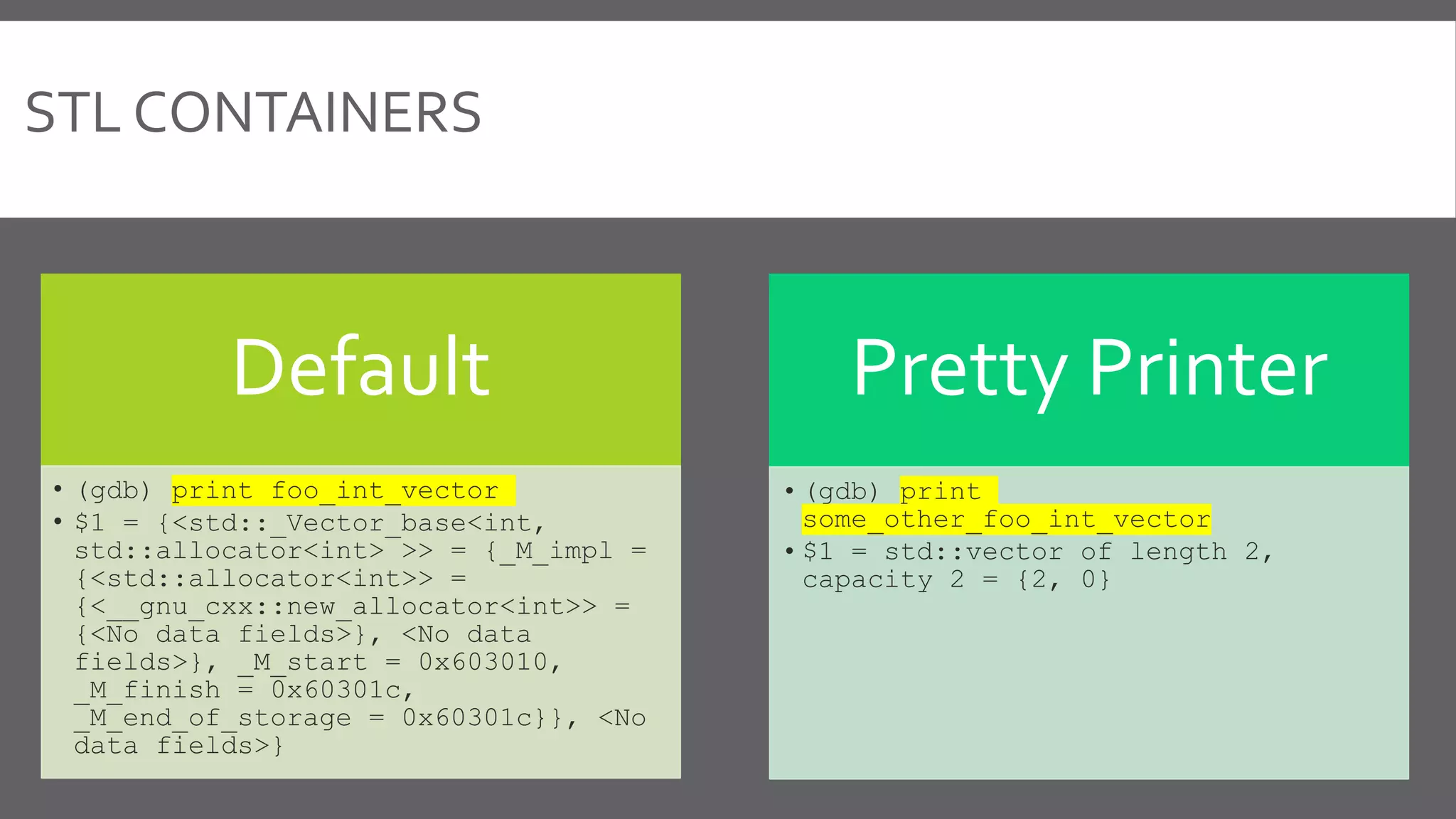
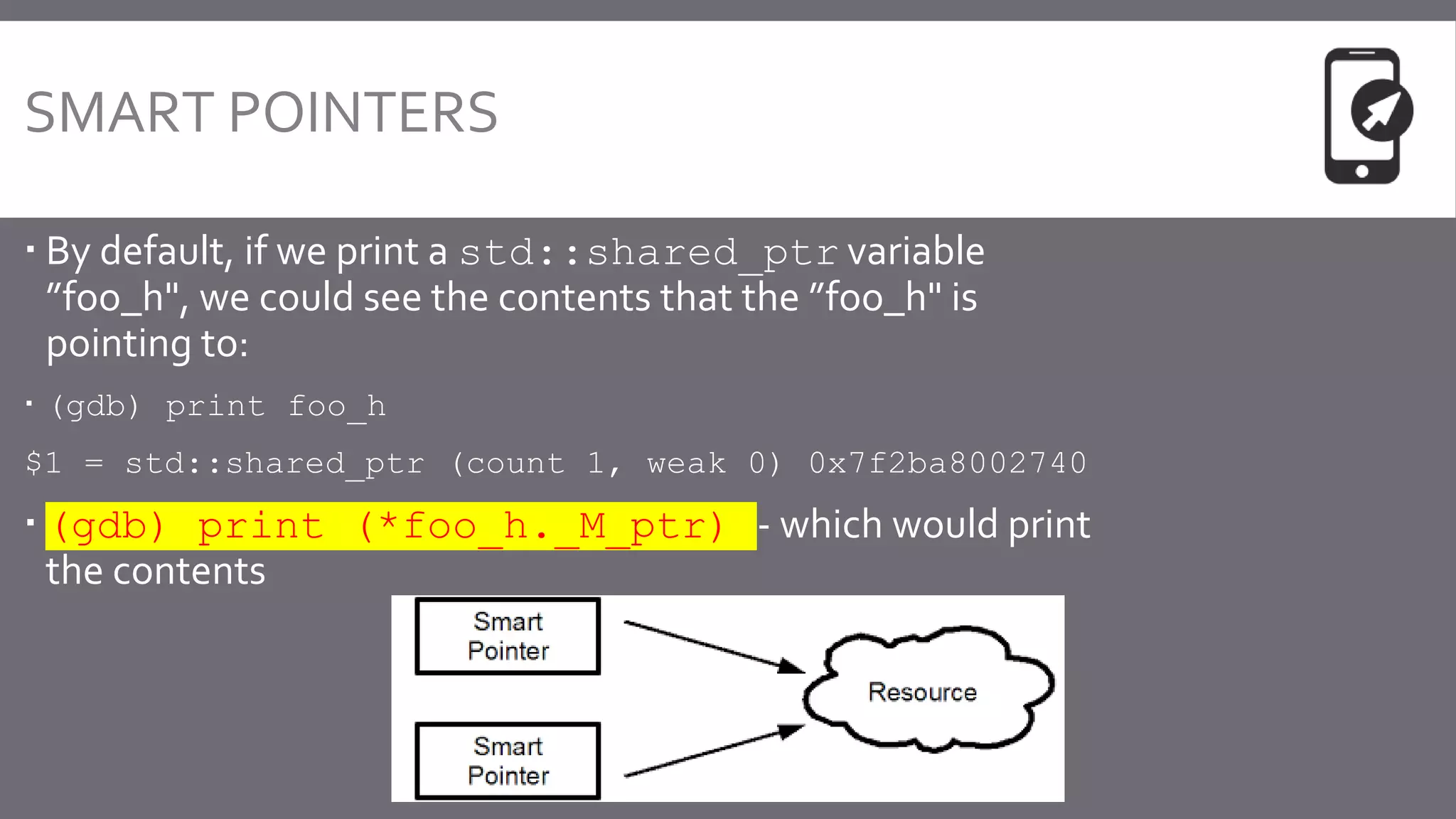
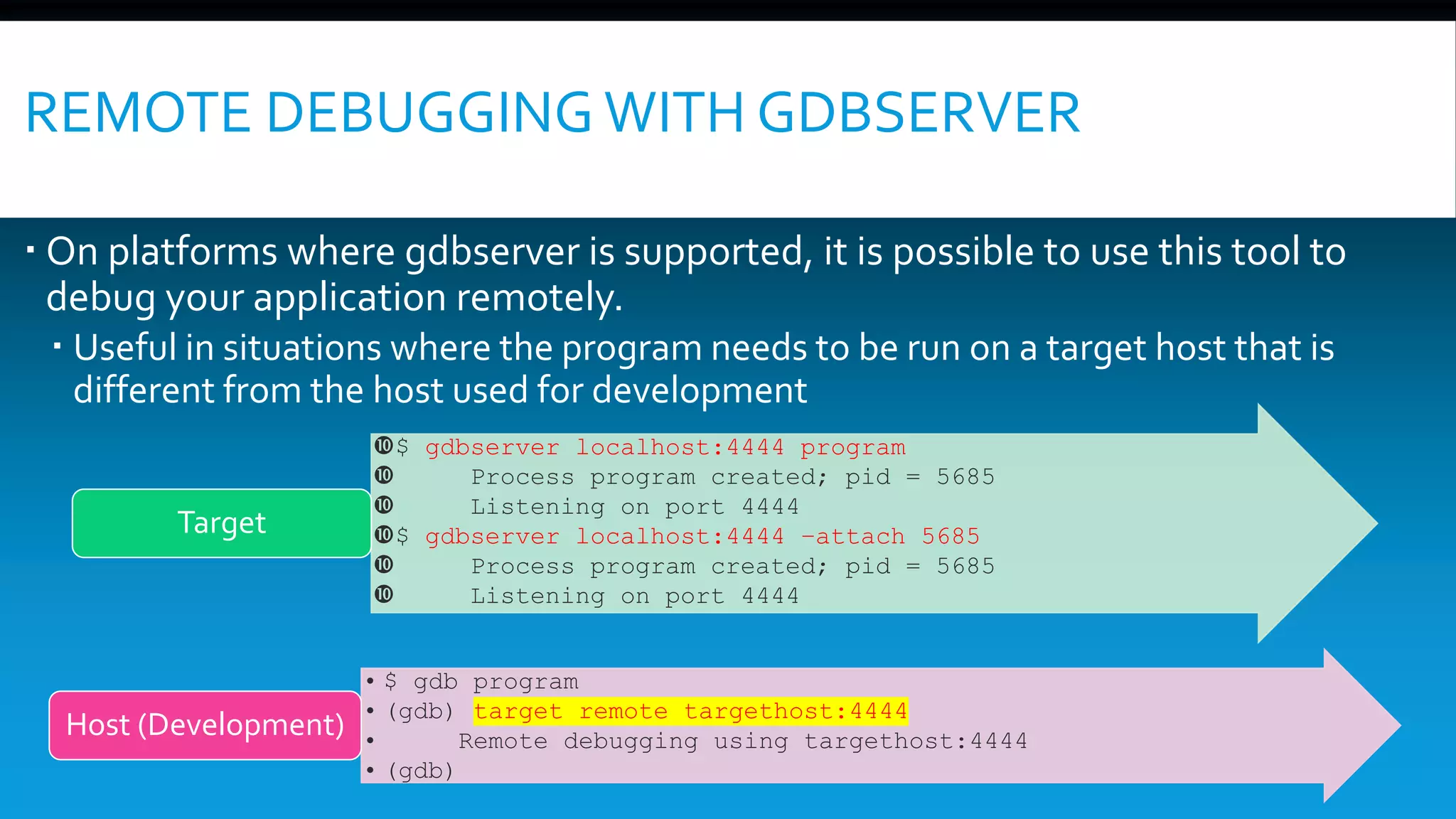
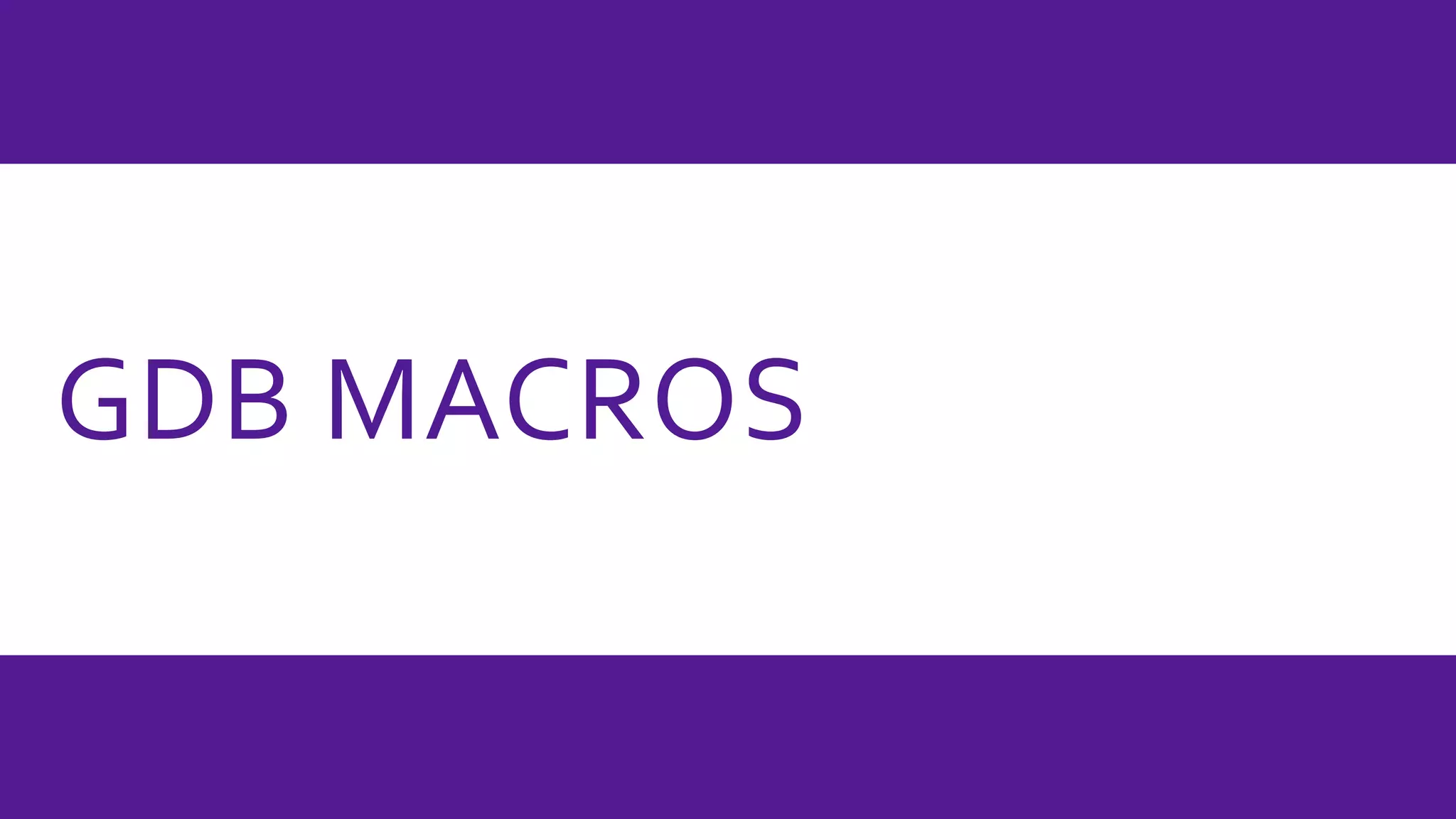
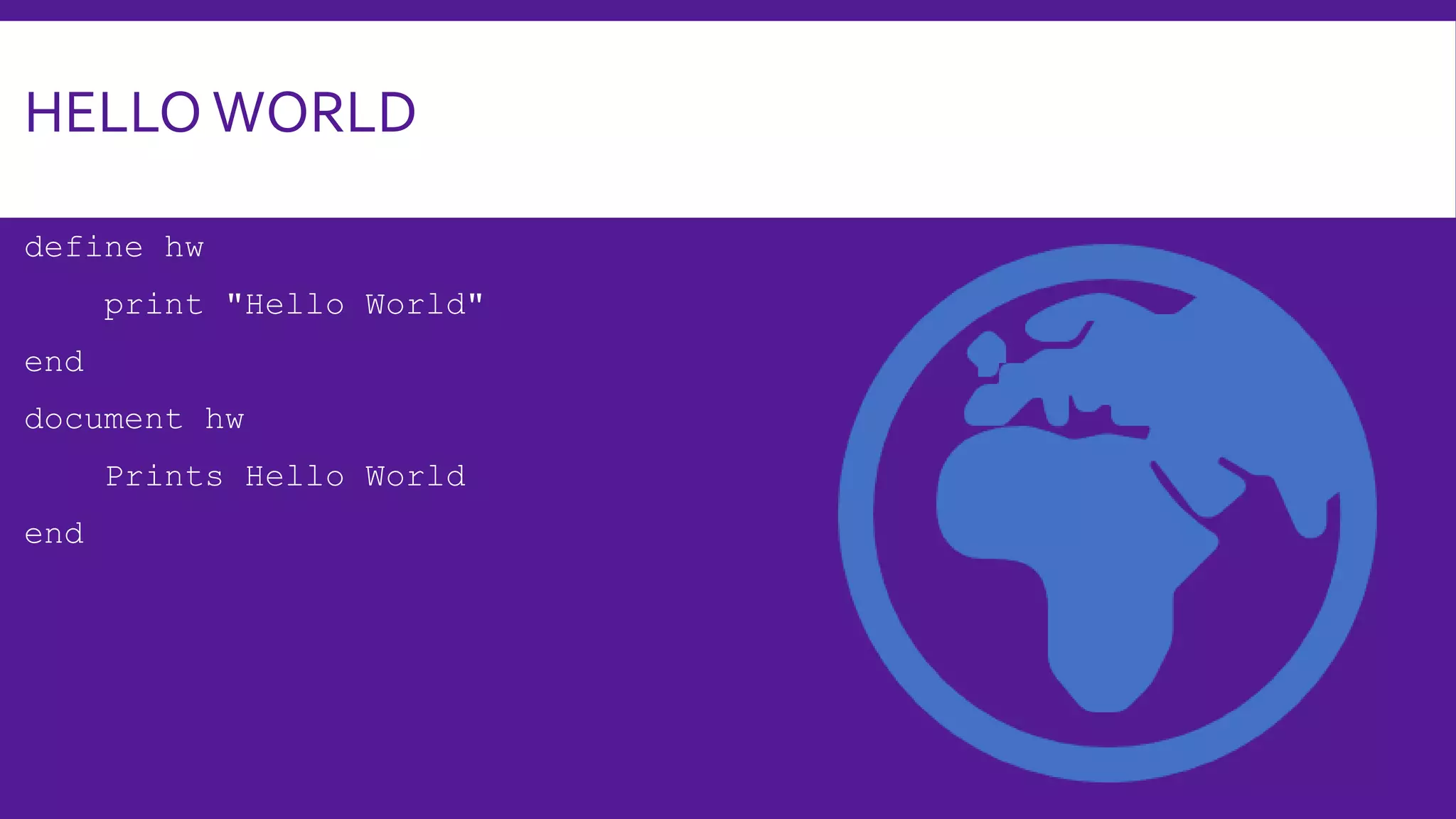

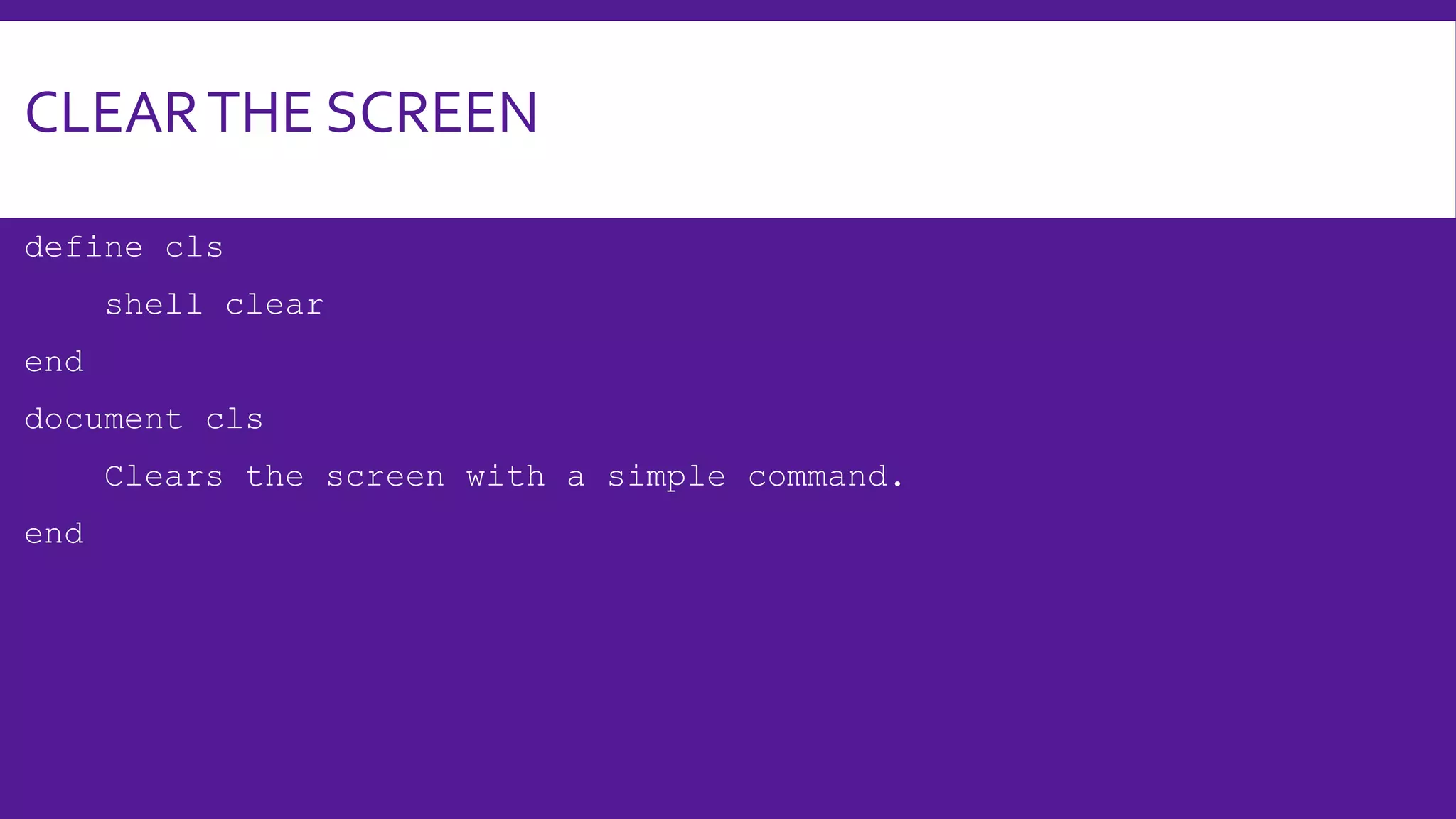
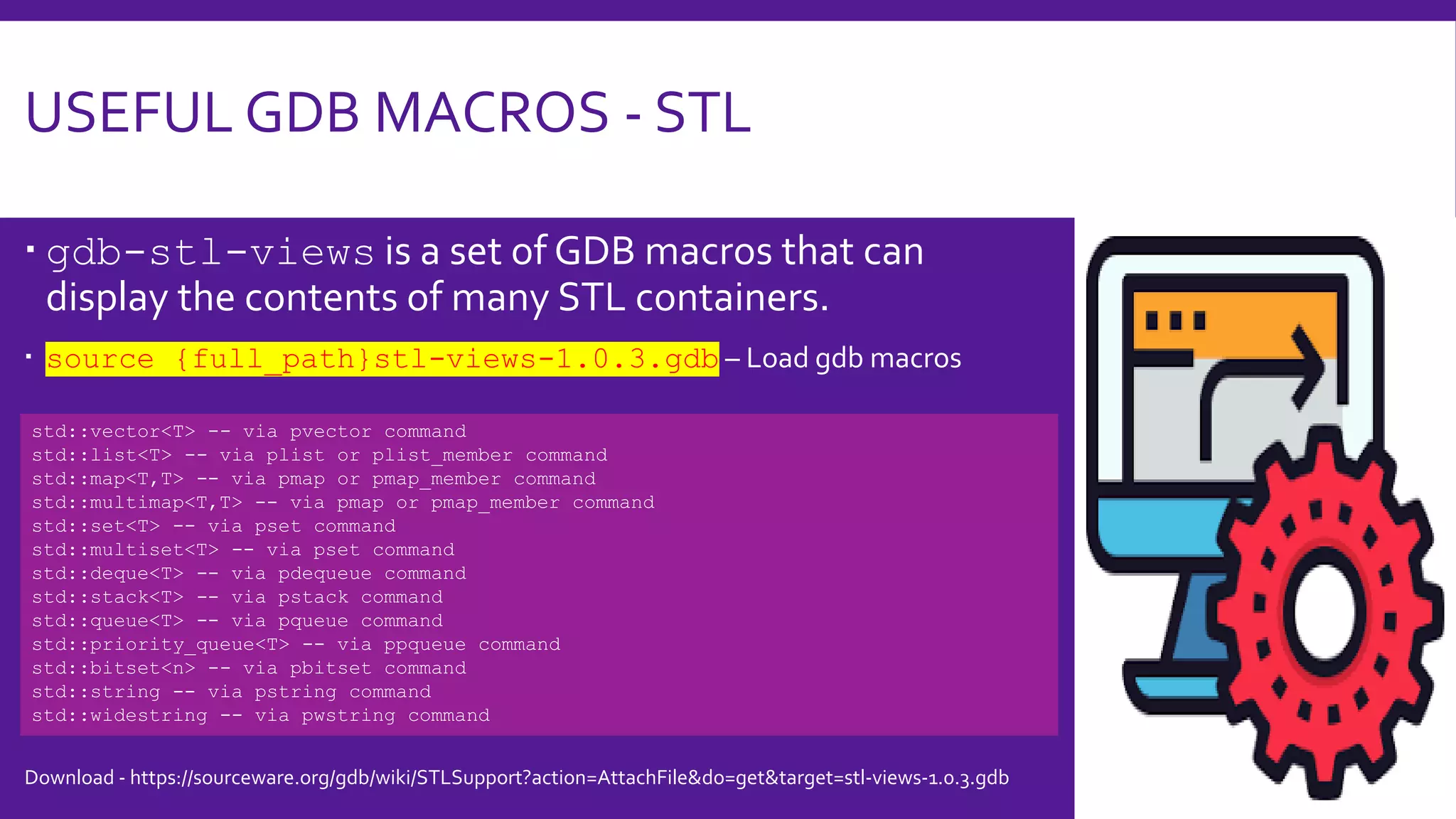
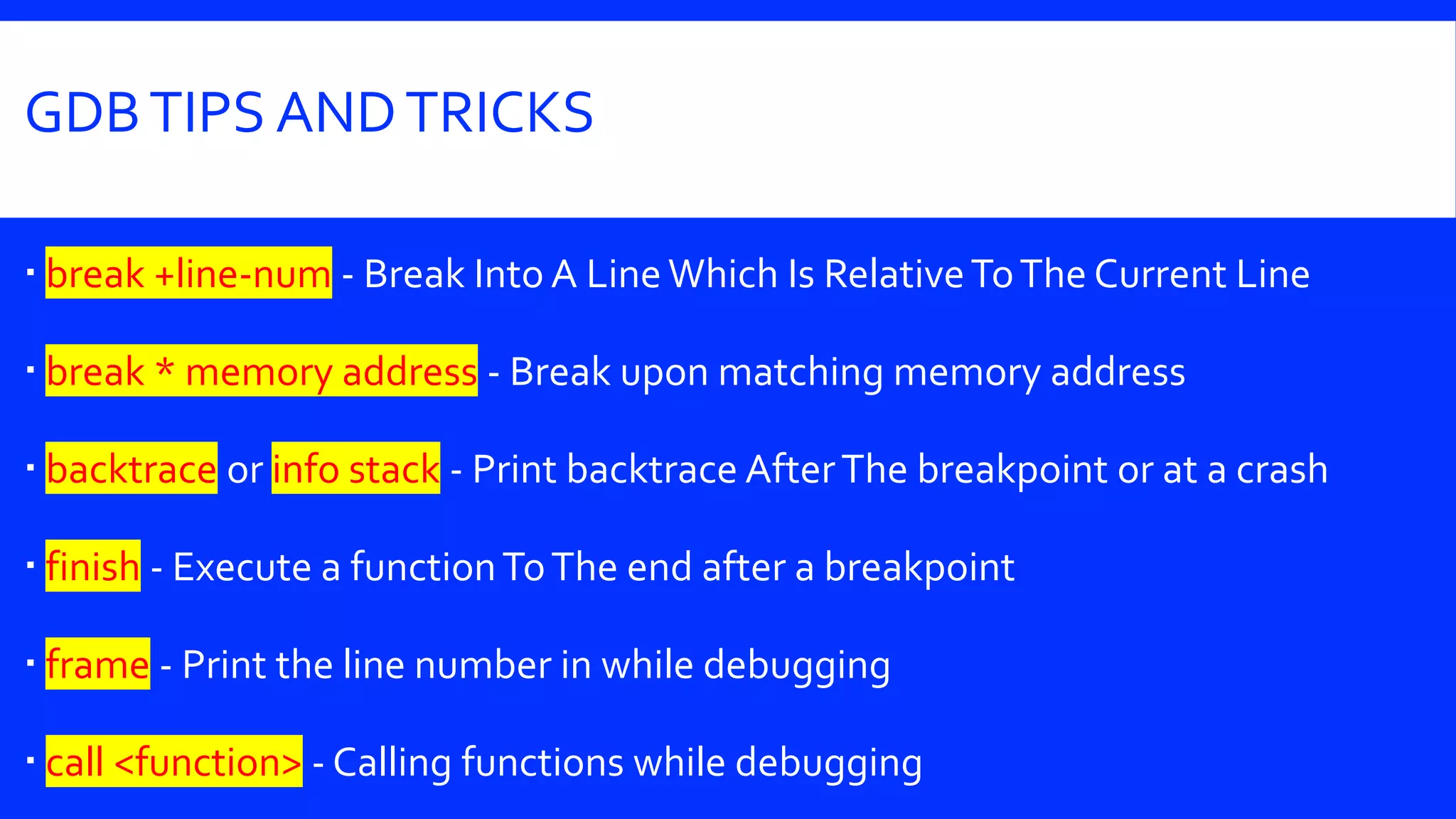
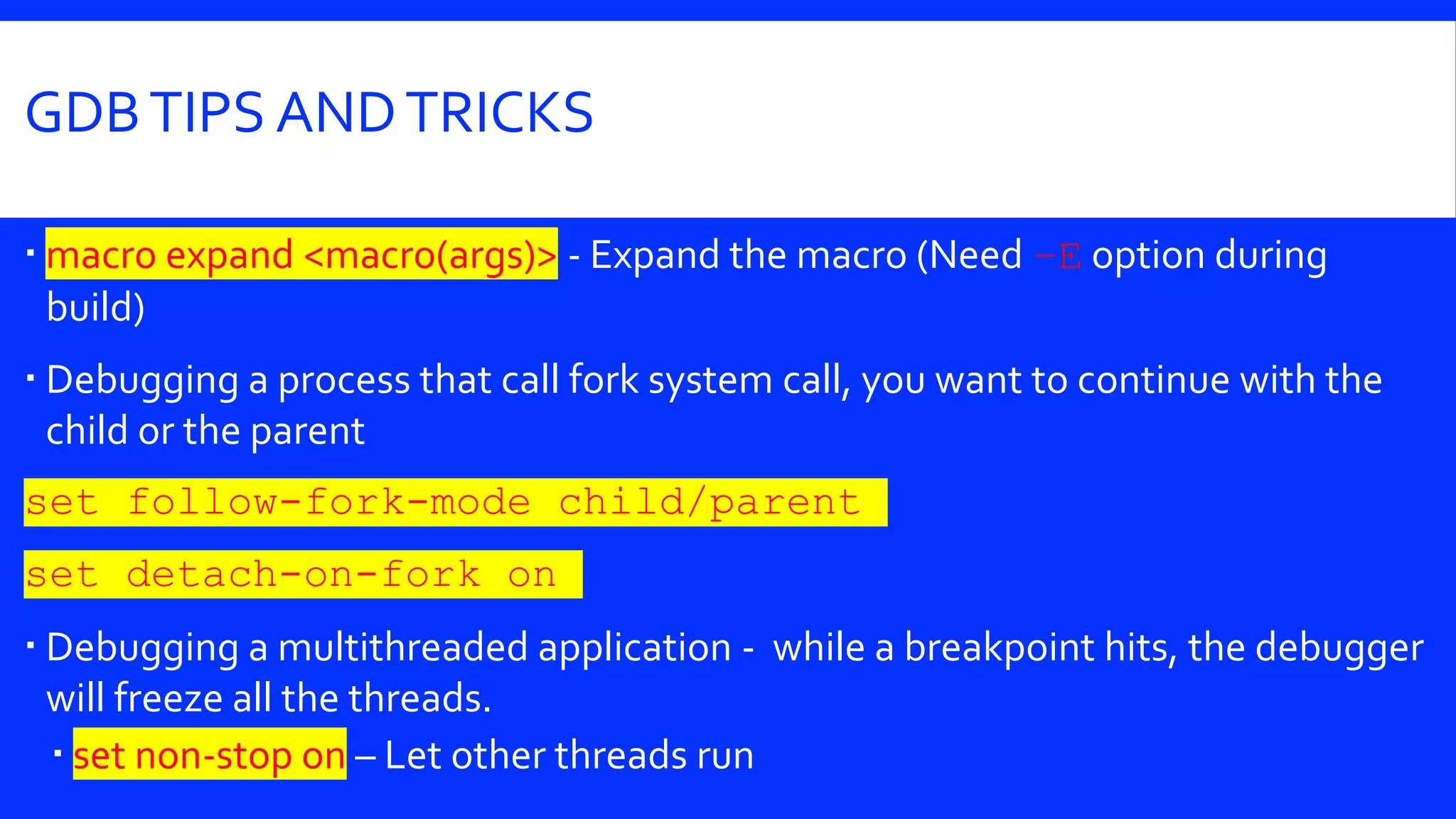
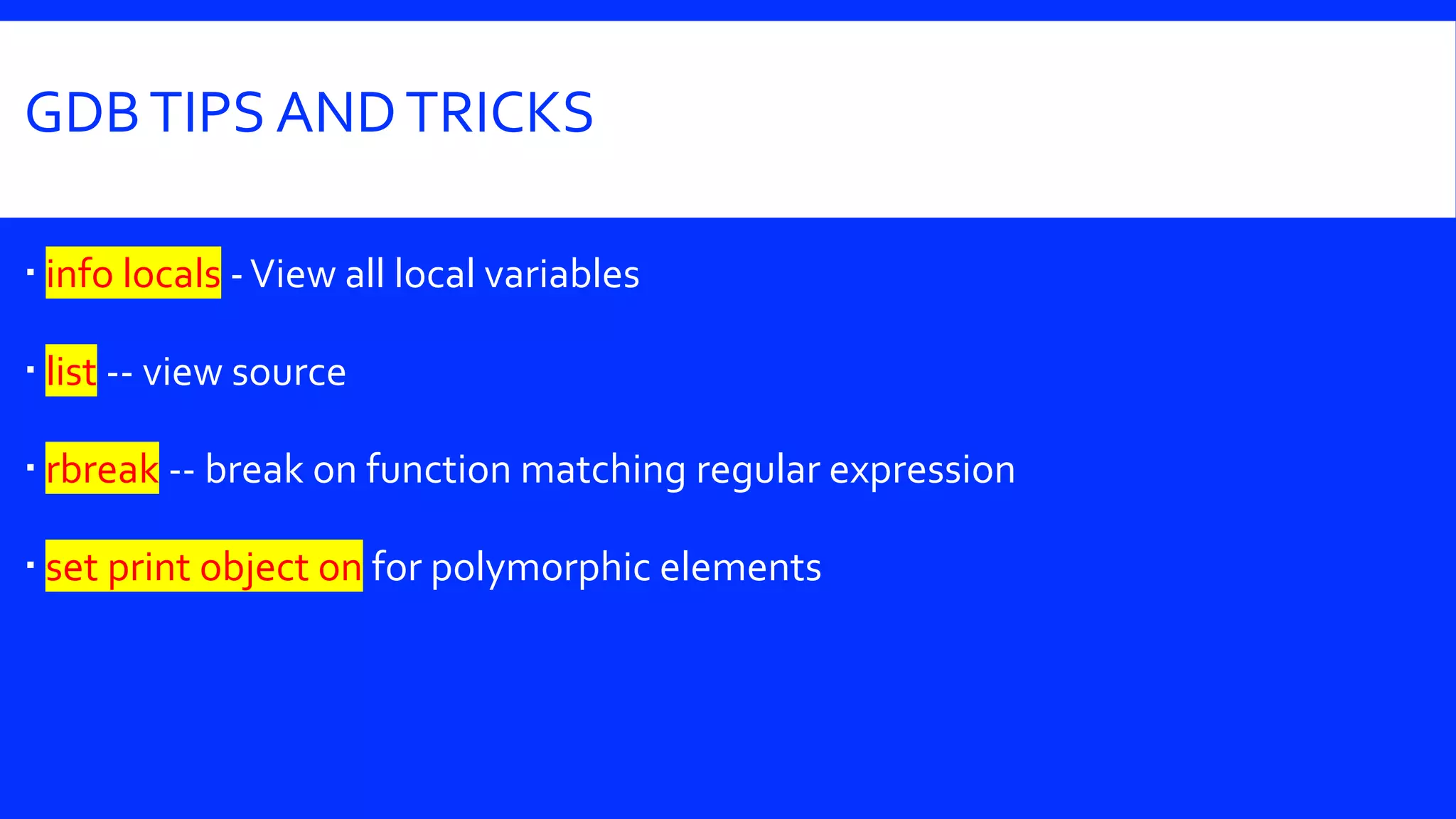
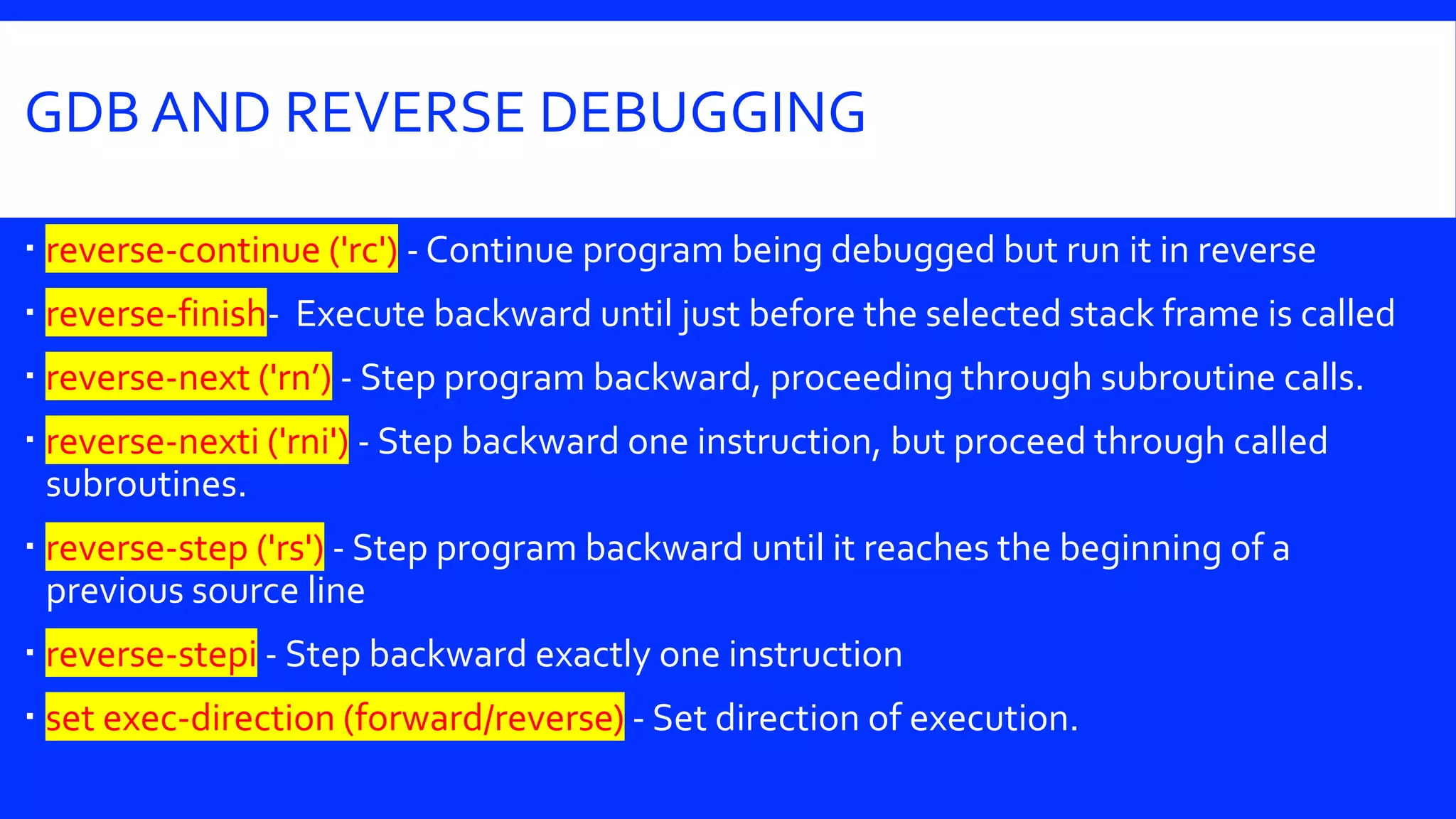
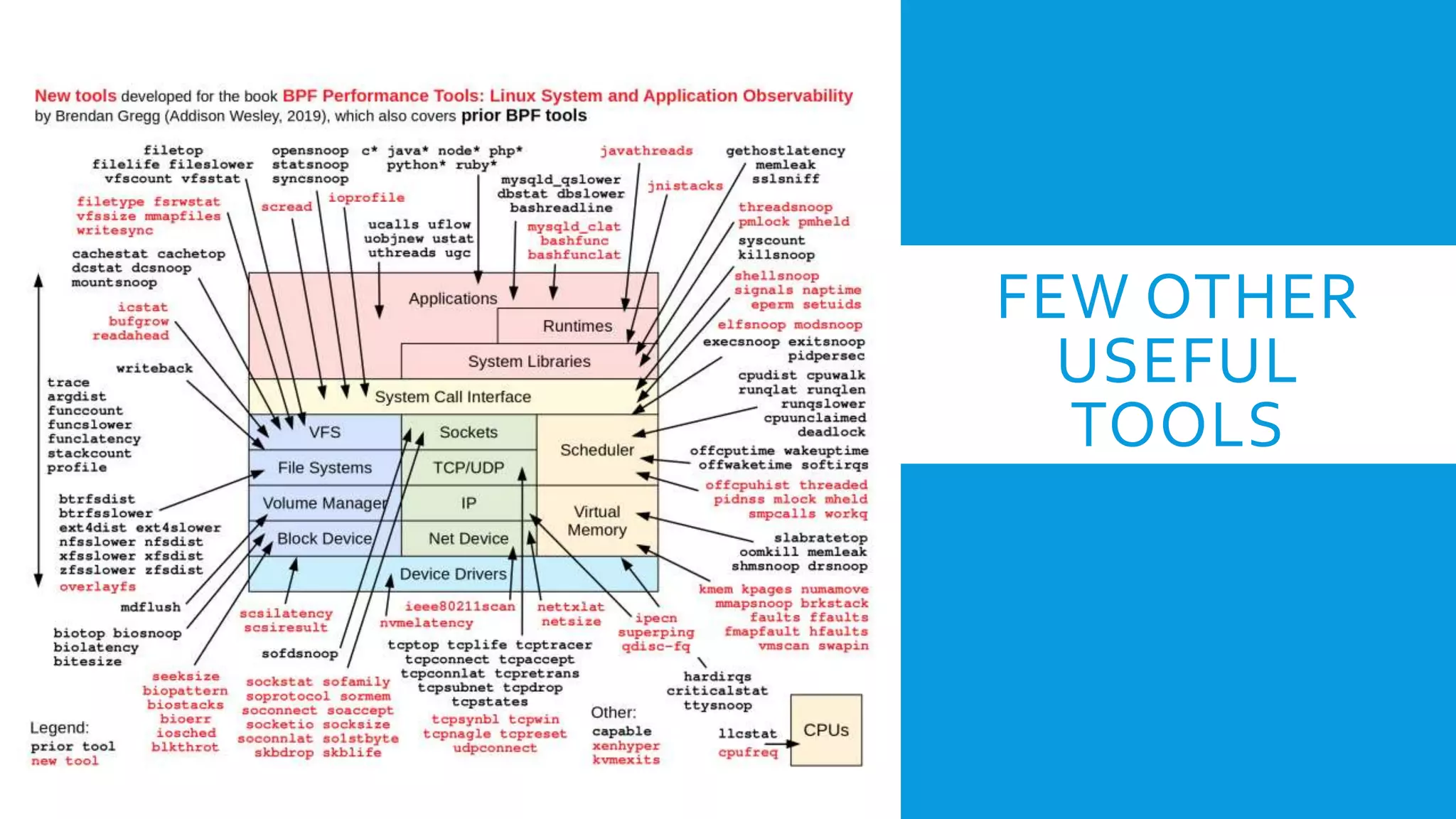

![GDB QUICK REFEREN CE G D B Version 4 Essential Commands gdb program [core] debug program [using coredump core] b [file:]function run [arglist] bt p expr c n s set breakpoint at function [in file] start your program [with arglist] backtrace: display program stack display the value of an expression continue running your program next line, stepping over function calls next line, stepping into function calls Starting G DB gdb gdb program gdb program core gdb --help start GDB, with no debugging ftles begin debugging program debug coredump core produced by program describe command line options exit GDB; also q or EOF(eg C-d) Stopping G DB quit INTERRUPT (eg C-c) terminate current command, or send to running process Getting Help help help class help command list classes of commands one-line descriptions for commands in class describe command Executing your Program run arglist run run . . . <inf >outf k i l l start your program with arglist start your program with current argument list start your program with input, output redirected kill running program t t y dev s et args arglist s et args show args use dev as stdin and stdout for next run specify arglist for next run specify empty argument list display argument list show env show env var s et env var string unset env var show all environment variables show value of environment variable var set environment variable var remove var from environment Shell Commands cd dir pwd make . . . shell cmd change working directory to dir Print working directory call “make” execute arbitrary shell command string [ ] surround optional arguments . . . show one or more arguments §c1998 Free Software Foundation, Inc. Permissions on back Breakpoints and Watchpoints set breakpoint at line number [in file] eg: break main.c:37 set breakpoint at func [in file] set break at offset lines from current stop break [file:]line b [file:]line break [file:]func break +offset break -offset break *addr break break . . . i f expr cond n [expr] tbreak . . . rbreak regex watch expr catch event info break info watch set breakpoint at address addr set breakpoint at next instruction break conditionally on nonzero expr new conditional expression on breakpoint n; make unconditional if no expr temporary break; disable when reached break on all functions matching regex set a watchpoint for expression expr break at event, which may be catch, throw, exec, fork, vfork, load, or unload. show deftned breakpoints show deftned watchpoints clear clear [file:]fun clear [file:]line delete [n] disable [n] enable [n] enable once [n] enable del [n] ignore n count delete breakpoints at next instruction delete breakpoints at entry to fun() delete breakpoints on source line delete breakpoints [or breakpoint n] disable breakpoints [or breakpoint n] enable breakpoints [or breakpoint n] enable breakpoints [or breakpoint n]; disable again when reached enable breakpoints [or breakpoint n]; delete when reached ignore breakpoint n, count times commands n [silent] command-list execute GDB command-list every time end breakpoint n is reached. [silent suppresses default display] end of command-list print trace of all frames in stack; or of n frames—innermost if n>0, outermost if n<0 select frame number n or frame at address n; if no n, display current frame select frame n frames up select frame n frames down describe selected frame, or frame at addr arguments of selected frame Program Stack backtrace [n] bt [n] frame [n] up n down n info frame [addr] info args info locals info reg [rn]. .. info all-r eg [rn] local variables of selected frame register values [for regs rn] in selected frame; all-r eg includes floating point Execution Control continue running; if count specifted, ignore this breakpoint next count times execute until another line reached; repeat count times if specifted step by machine instructions rather than source lines execute next line, including any function calls next machine instruction rather than source line run until next instruction (or location) run until selected stack frame returns continue [count] c [count] step [count] s [count] stepi [count] s i [count] next [count] n [count] nexti [count] ni [count] u n til [location] finish return [expr] pop selected stack frame without signal num jump line jump *address s et var=expr executing [setting return value] resume execution with signal s (none if 0) resume execution at specifted line number or address evaluate expr without displaying it; use for altering program variables Display print [/f ] [expr] p [/f ][expr] x d u o t a c f c a ll [/f ] expr x [/Nuf ] expr N u f disassem [addr] show value of expr [or last value $] according to format f: hexadecimal signed decimal unsigned decimal octal binary address, absolute and relative character floating point like print but does not display void examine memory at address expr; optional format spec follows slash count of how many units to display unit size; one of b individual bytes h halfwords (two bytes) wwords (four bytes) g giant words (eight bytes) printing format. Any print format, or s null-terminated string i machine instructions display memory as machine instructions Automatic Display display [/f ] expr show value of expr each time program stops [according to format f ] display undisplay n disable disp n enable disp n info display display all enabled expressions on list remove number(s) n from list of automatically displayed expressions disable display for expression(s) number n enable display for expression(s) number n numbered list of display expressions](https://image.slidesharecdn.com/gdb-191114221051/75/Debugging-Modern-C-Application-with-Gdb-63-2048.jpg)
![Expressions expr addr@len file: : nm {type}addr $ $n $$ $$n $ $ $var an expression in C, C + + , or Modula-2 (including function calls), or: an array of len elements beginning at addr a variable or function nm deftned in file read memory at addr as specifted type most recent displayed value nth displayed value displayed value previous to $ nth displayed value back from $ last address examined with x value at address $ convenience variable; assign any value show values [n] show conv show last 10 values [or surrounding $n] display all convenience variables Symbol Table info address s info func [regex] info var [regex] whatis [expr] ptype [expr] ptype type show where symbol s is stored show names, types of deftned functions (all, or matching regex) show names, types of global variables (all, or matching regex) show data type of expr [or $] without evaluating; ptype gives more detail describe type, struct, union, or enum GDB Scripts source script read, execute GDB commands from ftle script define cmd command-list end document cmd help-text end create new GDB command cmd; execute script deftned by command-list end of command-list create online documentation for new GDB command cmd end of help-text Signals handle signal act print noprint stop nostop pass nopass info signals specify GDB actions for signal: announce signal be silent for signal halt execution on signal do not halt execution allow your program to handle signal do not allow your program to see signal show table of signals, GDB action for each Debugging Targets target type param connect to target machine, process, or ftle help target attach param detach display available targets connect to another process release target from GDB control Controlling G DB s et param value show param set one of GDB’s internal parameters display current setting of parameter Parameters understood by s et and show: complaint limit confirm on/off editing on/off height lpp language lang li s t s i z e n prompt str radix base verbose on/off width cpl write on/off number of messages on unusual symbols enable or disable cautionary queries control readline command-line editing number of lines before pause in display Language for GDB expressions (auto, c or modula-2) number of lines shown by l i s t use str as GDB prompt octal, decimal, or hex number representation control messages when loading symbols number of characters before line folded Allow or forbid patching binary, core ftles (when reopened with exec or core) groups with the following options:history . .. h . .. h exp off/on h f i l e filename h size size h save off/on print . .. p . .. disable/enable readline history expansion ftle for recording GDB command history number of commands kept in history list control use of external ftle for command history groups with the following options: p address on/off print memory addresses in stacks, values p array off/on compact or attractive format for arrays p demangl on/off source (demangled) or internal form for C + + symbols p asm-dem on/off demangle C + + symbols in machine- instruction output p elements limit number of array elements to display p object on/off p pretty off/on p union on/off p vtbl off/on print C + + derived types for objects struct display: compact or indented display of union members display of C + + virtual function tables show commands show commands n show commands + show last 10 commands show 10 commands around number n show next 10 commands Working Files f i l e [file] core [file] exec [file] symbol [file] load file add-sym file addr info f i le s path dirs show path info share use file for both symbols and executable; with no arg, discard both read file as coredump; or discard use file as executable only; or discard use symbol table from file; or discard dynamically link file and add its symbols read additional symbols from file, dynamically loaded at addr display working ftles and targets in use add dirs to front of path searched for executable and symbol ftles display executable and symbol ftle path list names of shared libraries currently loaded Source Files d ir names d ir show d ir add directory names to front of source path clear source path show current source path l i s t l i s t - l i s t lines [file:]num [file: ]function +off -off *address l i s t f,l info line num info source info sources forw regex rev regex show next ten lines of source show previous ten lines display source surrounding lines, specifted as: line number [in named ftle] beginning of function [in named ftle] off lines after last printed off lines previous to last printed line containing address from line f to line l show starting, ending addresses of compiled code for source line num show name of current source ftle list all source ftles in use search following source lines for regex search preceding source lines for regex G DB under GNU Emacs M-x gdb C-h m M-s M-n M-i C-c C-f M-c M-u M-d C-x & C-x SPC run GDB under Emacs describe GDB mode step one line (step) next line (next) step one instruction (stepi) ftnish current stack frame (finish) continue (cont) up arg frames (up) down arg frames (down) copy number from point, insert at end (in source ftle) set break at point G DB License show copying show warranty Display GNU General Public License There is NO W ARRANTY for GDB. Display full no-warranty statement. Copyright §c 1991, ’92, ’93, ’98 Free Software Foundation, Inc. Rol a nd H. Pesch The author assumes no responsibility for any errors on this card. This card ma y b e freely distribut ed under t he t er ms of t he G N U General Public License. Please contribute t o development of this card by annotating it. Improvements can b e sent t o bug-gdb@gnu.org. G D B itself is free software; you are welcome t o distribute copies of it under t he t er ms of t he G N U General Public License. There is absolutely no warranty for G D B.](https://image.slidesharecdn.com/gdb-191114221051/75/Debugging-Modern-C-Application-with-Gdb-64-2048.jpg)

